Year Book 2019/20
Australian Friends of The Hebrew University of Jerusalem
Australian Friends of The Hebrew University of Jerusalem





Australian Friends of The Hebrew University of Jerusalem
Australian Friends of The Hebrew University of Jerusalem






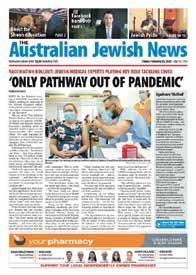




Once again, we are delighted to bring you our Yearbook in both an electronic version and for those that still like to ‘hold a copy in their hands’ we have a limited number of hard copies available from our office.
In my Yearbook message last year, I expressed the hope “….that by the time the 2020 Yearbook reaches you, that the world will have started to recover from one of the worst pandemics in history.”
Well, it has taken a whole year from June 2020 for us to start to feel that there is some light at the end of the tunnel and we are extremely grateful here in Australia that we are in a far better situation than many others around the world. Our Yearbook features some of the amazing work and activities that took place both in Israel and here in Australia. Despite the challenges posed by covid, the Hebrew University continued to be “a shining light unto the nations” and we, as the Australian Friends are proud to represent Israel’s and indeed one of the world’s premier institutions of higher learning here “Downunder.”
With acknowledgement to Ram Semo, Director for Advancement & External Relations at the Hebrew University, for the points below, looking back over the last year, what has changed at the Hebrew University and indeed for us as the Australian Friends?

• We realized on March 26, 2020 that we are part of the solution to the global problem and took advantage of this fact to continue to actively fundraise for vital research not least of which research into the management of covid.
• We learned that it is possible to work remotely even though this is not the ideal and an area that we might look to focus on in the future is how a hybrid situation might work once we get past covid.
• We meet with the whole world today much more than before thanks to zoom but we really miss the physical meetings and long for their return because more and more, we start to hear that many are getting “zoomed out” because of the plethora of webinars, zoom meetings etc.
• We realized that it is relatively easy to bring the University to the world, when it is not possible to bring the world to the University!
• We even held a virtual Board of Governors.
• We delved deep into the worlds of social impact, impact measurement and impact investments that will accompany us for years to come.
• Last, but certainly not least, our staff are the most important part of making these changes a success. Without good people, we have no chance of fulfilling our dreams. So this year we have made tremendous efforts to maintain high motivation and help strengthen our community through organizational connectedness both within and outside of the organization.
We are extremely grateful to Ram and the Division for External Relations for maintaining, and indeed even improving contact with Friends organizations around the world during these difficult days.

Aside from a virtual Board of Governors, we have had virtual international marketing meetings with the Division and our colleagues around the world and this has helped maintain the family feeling and has enabled the sharing of ideas and material so that together, we can achieve more for the Hebrew University and indeed for humanity as a whole. While on the subject of staff and thanks, I want to thank our small team who help make things happen at the Australian Friends – they are all mentioned on page 27 – but in regards to this Yearbook, Jamie Wise has assisted greatly with the advertising coordination – thank you Jamie. Unfortunately, while writing this message, I learned that Moran Pitchon, our Project Manager will be returning to Israel at the end of May. Moran started at the Australian Friends in 2015 managing the student portfolio and PR and marketing and with her prowess in the IT area, she was the driving force in implementing our new data base management program and so much more. I will miss Moran’s input and exemplary work ethic but above all her dedication and commitment to the organisation. Our loss is Israel’s gain and we wish Moran and her family hatzlacha raba – good health, happiness, peace and fulfilment as they settle back in Israel. Her presence will be sorely missed. I also thank Shira Halberstadt for the design of our Yearbook and Philip Joel of Kwik Kopy who always goes the extra mile for us. We would not be able to produce this Yearbook without the support of our advertisers many of whom have advertised with us for more than 20 years so a very big thank you for your continued support.
Finally, to our members, donors and supporters throughout Australia, we are most appreciative of your friendship and donations to medical research through Hebrew U Health Promotions or for student support for Australian students wishing to study at the Hebrew University through our scholarship fund both of which entities offer Australian donors tax deductibility.
We hope you will enjoy our 2021 Yearbook and that in the months ahead, we will be able to move back to a real world instead of a virtual one and that with your support, we will ensure that the Hebrew University continues as Israel’s pre-eminent university and one of the world’s best!
Thank you for your continuing support and friendship.
Wishing you good health
 ROBERT SCHNEIDER Chief Executive Officer
ROBERT SCHNEIDER Chief Executive Officer
Australian Governors of the Hebrew University of Jerusalem
Mr Michael Dunkel Governor
Mr Stuart Silbert OAM Governor
Mr Robert Simons OAM Governor
Mr Jonathan Goodman Governor
Mr Sam Lipski AM Governor
Mr Jerremy Leibler Governor
Mr Barry Joseph Governor
Australian Recipients of Honorary Doctorates of the Hebrew University of Jerusalem
Mr Marc Besen AO (VIC)
Mr Michael Dunkel (NSW)
Mrs Agnes Ginges (NSW)
Mr Harry Hoffman AM (WA)
Mr John Howard AC (NSW)
Mr Stuart Silbert OAM (WA)
Mr Robert Simons OAM (NSW)
Mr Harry Triguboff AO (NSW)
Mr Israel Blankfield * (VIC)
Mr Ron Castan AM QC * (VIC)
Sir Zelman Cowen AK * (VIC)
Mr Berel Ginges * (NSW)
Mr John Hammond * (NSW)
Mr Robert J Hawke AC * (VIC)
Dr Henry Krongold AM * (VIC)
Mr Isador Magid AM * (VIC)
Mr Richard Pratt * (VIC)
Mr Philip Moses Governor
Assoc Prof Peter Winterton AM Governor
Mrs Agnes Ginges Honorary Governor
Professor Leon Mann AO Honorary Governor
Mr Harry Triguboff AO Honorary Governor
Australian Recipients of Honorary Fellowships of the Hebrew University of Jerusalem
Mr Michael Dunkel (NSW)
Mrs Shirley Ehrlich (NSW)
Mr Harry Hoffman AM (WA)
Mrs Sylvia Hoffman (WA)
Mr Leon Kempler OAM (VIC)
Mr Barry Joseph (NSW)
Professor Leon Mann AO (VIC)
Mr Robert McGarvie AC QC (VIC)
Mr Philip Moses (NSW)
Mr Wolfie Pizem OAM (NSW)
Mr Stuart Silbert OAM (WA)
Mr Robert Simons OAM (NSW)
Mrs Basil Starr (VIC)
Mr Israel Blankfield * (VIC)
Mr Ron Castan AM QC * (VIC)
Mr Alroy Cohen * (NSW)
Mr Maurice Cohen OBE * (VIC)
Mrs Felicia Einhorn * (NSW)
Mr Stefan Einhorn OAM * (NSW)
Mr Joseph Frank * (NSW)
Mr Max Freilich OBE * (NSW)
Mr Berel Ginges * (NSW)
Mrs Nerida Goodman MBE * (NSW)
Mr John Hammond * (NSW)
Mr Robert J Hawke AC * (VIC)
Mr A D Hallam * (VIC)
Dr Jack Hoffman OAM * (WA)
* (Deceased)
Mr Alan K Milston OAM * (NSW)
Professor Louis Waller AO * (VIC)
President: Mr Michael Dunkel
Vice President: Mr Philip Moses
Hon. Treasurer Mr Robert Greenfield
Hon. Secretary Mr Jonathan Goodman
NSW State President: Mr Barry Joseph
WA State President: Ass. Prof. Peter Winterton AM
Hon. Chairman: Mr Robert Simons OAM
Chief Executive: Mr Robert Schneider
National Office
P O Box 876 Bondi Junction
NSW 1355
Tel.: (02) 9389 2825
Fax: 02 9387 5584
Email: austfhu@austfhu.org.au
Website: www.austfhu.org.au
The Hebrew University of Jerusalem, Israel’s first university, is a multidisciplinary institution of higher learning and research where intellectual pioneering, cutting-edge discovery, and a passion for learning flourish. It is a center of international repute, with ties extending to the worldwide scientific and academic community, where teaching and research drive innovation and provide the broadest of education for its students.
Ranked among the world’s leading universities, the Hebrew University is an institution where excellence is emphasized; where advanced, postgraduate study and research are encouraged; and where special programs and conferences attract students and academics from around the world. At its core, the Hebrew University’s mission is to develop cutting- edge research, to educate future leaders, and to nurture generations of outstanding scientists and scholars in all fields of learning.
President
Prof. Asher Cohen
Rector
Prof. Barak Medina
Chairman of the Board of Governors
Daniel Schlessinger
Chancellor
Prof. Menahem Ben-Sasson
Honorary Chairs of the Board of Governors
Michael Federmann Charles H. Goodman
Vice-President for Advancement & External Relations
Ambassador Yossi Gal
Vice-President for Research & Development
Prof. Re’em Sari
Vice-President & Director-General
Yishai Fraenkel
Vice-President for International Affairs
Prof. Oron Shagrir
Vice-President for Strategy & Diversity
Prof. Mona Khoury-Kassabri
Vice-Rectors
Prof. Berta Levavi-Sivan Prof. Lilach Sagiv
Comptroller
Zvi Aizenstein
Director, Division for Advancement & External Relations
Ram Semo
6 campuses: three in Jerusalem
(Mount Scopus, Edmond J. Safra, and Ein Kerem) and in Rehovot, Beit Dagan, and Eilat
4,242 projects in progress in University departments and some 100 subject - related and interdisciplinary research centers
24,611 students , including 13,242 undergraduates, 6,435 master’s students, 2,193 doctoral candidates, and 2,741 overseas, pre-academic students, postdoctoral fellows, and others
983 faculty members
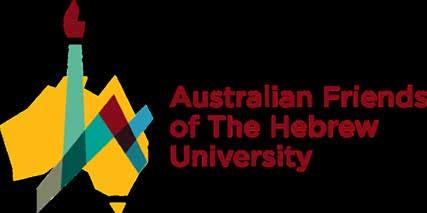
Social Impact is a core value of the Hebrew University. Although our University is, first and foremost, an academic institution, what matters most is the impact we make on people, communities, and the environment. We take great pride in seeing how the Hebrew University leads by example – supporting and encouraging the people and projects making a difference in this world and ensuring that our priorities are in tune with this message.
In the Australian Friends Yearbook, you will read articles that illustrate how Hebrew University students, faculty, and alumni are making an impact on the world around them.

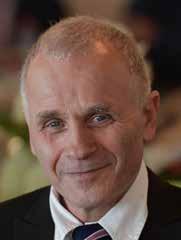
One area in which the Hebrew University has had significant impact this year relates to the Coronavirus. As the pandemic upended our world as we know it, the University was able to step up and show compassion to our students in a variety of ways, while our medical students and researchers established the joint Hadassah-Hebrew University virology lab, significantly contributing to the country’s diagnostic efforts.
Additionally, researchers across faculties and disciplines are conducting cutting-edge studies on the virus and its social implications. Their insights, policy recommendations, and innovations are impacting the local and global efforts to combat and cope with the Coronavirus.
It is our hope that this Yearbook will inspire you to appreciate the many ways that the Hebrew University is making a tangible, sustained social impact in the world. As an institution of higher learning, we cannot measure our worth by academics alone – we have an ethical imperative to evaluate and measure how we are making the world a better place for all of humankind.
We wish our friends and donors in Australia good health and fulfilment and we thank you for your continuing support of the Hebrew University. ■
Andreasens Green is part of Australia’s largest wholesale supplier of plants to the landscape industry. It has supplied many iconic developments over the last 40 years including Barangaroo Headland Park. It’s founder Maurice Green AM is proud to continue t o support the Australian Friends of The Hebrew University .


The Hebrew University’s Board of Governors has reelected University President Prof. Asher’s Cohen to a second term. “Since assuming the University presidency four years ago, Professor Cohen has helped the university attain new research and teaching heights and placed the institution on stable financial footing,” shared Daniel Schlessinger, Chairman of HU’s Board of Governors. “The past year has been defined by deep challenges brought on by the global COVID-19 epidemic. We are particularly grateful for Cohen’s exceptional leadership throughout this time.”
The Australian Friends of the Hebrew University congratulates Professor Cohen on his reelection and looks forward to continuing to work with him in growing Israel’s #1 university. Professor Cohen was due to visit Australia in March 2020 but this visit was cancelled due to covid. There are plans for him to now visit in Australia this coming December covid permitting!!!
After graduating from the Hebrew University with a B.A. in Economics and an M.A. in Psychology, Cohen completed his doctoral and post-doctoral studies at the University of Oregon. He served as an assistant professor at Indiana University before returning to HU’s Department of Psychology as a senior lecturer and then department head. Cohen began his tenure as president of Hebrew University in 2017 following his term as Rector. We are happy to share below excerpts from Professor Cohen’s most informative acceptance speech following his reelection ……..
“The Hebrew University was the very first big Zionist project when it was founded more than a century ago as the university of the Jewish people and as a liberal and pluralistic institution, and I believe it has been true to its mission ever since. The Hebrew University is the leading university in Israel and one of the leading universities in the world. It is truly a privilege to serve as the president of this great institution. I am humbled and honored to be elected to a second term. I would like to thank the search committee, the board of managers, the executive board and the board of governors for approving my nomination. I will take this opportunity to review what we did
during my first term, and briefly sketch our vision for the future. Before doing so, I would like to acknowledge some of the people that were with me, helped me, pushed me and inspired me along the way so far and that I hope will continue to assist and push me in the future. I believe that we have a great management team: The rector, Professor Barak Medina, the director general and vice president Mr. Yishai Fraenkel, vice president for internationalization, Professor Oron Shagrir, vice president for research and development, Professor Reem Sari, and vice president for external affairs, Mr. Yossi Gal. I cannot overemphasize the importance of the management team and I would like to thank each every one of them. We now added a new member to this team, Prof. Mona Khoury-Kassabri, and I am sure she will be a great contributor to this team. I would like to thank Professor Menachem Ben Sasson, the chancellor. I think by now you all know Menachem in all of his important roles over the years, really decades!, and you know what a great asset he is. Many of the lay leaders of the university provided invaluable help and support. I am not able to mention here all of them. I will single out two of them that were with me most of this term: Mr. Dan Schlesinger, chairman of the Board of Governors, and Mr. Harel Beit-On, chairman of the Board of Managers. I consider both Dan and Harel as personal friends of mine, but more importantly, I rely heavily on their wisdom, vision, and their willingness to provide support and guidance whenever I seek it. Lastly, I would like to thank the entire community of faculty members and friends around the globe. It is a great comfort that I know I can rely on you when the university needs you. Thank you all!! Unfortunately, the world is still dealing with the Corona virus pandemic. I hope that with the vaccination program in place we will see, in the near future, the end of this horrible pandemic. At least in Israel there are encouraging signs that this is indeed the case. The pandemic posed and still poses grave challenges in all parts of our life. I have outlined previously how the university is dealing with the pandemic and I will not repeat it today. I
will just make three key observations: 1) I hope it is now clear to everyone that the only long term solution to this pandemic and to many other great challenges the world faces is via science. The successful vaccination program that is operational in Israel today is just one notable example of solutions provided by science. 2) I am truly proud of the manner by which we managed to maintain our activities during the pandemic. Specifically, we finished two full semesters of teaching and we are now in the midst of the third semester. We faced a myriad of problems and overcame them as much as possible. The numbers tell the story: The proportion of students that completed these semesters is no smaller, in fact appears to be a bit higher, than that of pre-corona semesters. Our academic and administrative faculties did an absolutely marvelous job in order to provide this teaching. I have thanked them many times in the past for their dedication and this is one more opportunity to say thank you to our faculties for their amazing commitment and dedication. 3) While the pandemic is by no means over, I dare to say that there are good signs that the end is in sight. We brought many of our students back to the campuses two weeks ago. We plan to have a physical Board of Governors in October. It may seem a bit optimistic to those of you that are still facing the hardships of the pandemic but I am cautiously optimistic that we are approaching the end stage of this ordeal and will be able to host you here in Jerusalem. Let me now turn to a brief review of what we tried to achieve during the first term of my presidency. Our vision for the university includes focusing on four major categories: Our first goal is to make sure that we have world-class top-notch research and teaching. When people think about universities, they mostly think about research and teaching, and this is indeed our bread and butter. Like all research universities, we are defined by our success in this domain with 8 Nobel laureates and countless other awards and achievements of our faculty and students. In this day and age, part of excellence in both research and teaching involves internationalization. Yes, international activity
has clearly been hampered by the pandemic BUT long-term, it remains a top goal for us. We are a public university that is funded heavily, albeit insufficiently, by the state. As a public university we also focus on strengthening our connections with the industry and on being involved in the community in Jerusalem, in Israel, and in the Jewish world. I will now describe some of the activities within each of these four categories. A leading research university such as the Hebrew University can be compared to an aircraft carrier - very good but difficult to shift course. Yet, with vision and a clear plan, it is possible to make required changes and to pursue new dreams. This is essentially what we did at the beginning of the term. We built a detailed 10 year plan for our research and teaching that is based on our vision of a top university at the cutting edge of research and teaching. Within this vision, one of the most important goals of the university is to bring in talented new faculty members. The quality of the university in 10 and 20 years from now is heavily dependent on the quality of the new faculty members that we bring today. Two aspects were particularly important to us in the recruitment of new faculty members. First, the number of faculty members at the Hebrew University got smaller with the years, due to budgetary constraints. Our plan included a significant increase in the overall number of our faculty members with an emphasis on the experimental sciences. And this is exactly what we did. However, just bringing talented people is not enough. It is mandatory to provide these young women and men with adequate conditions so that they will be able to develop ground-breaking research programs. We did it. It costs us about 25 million dollars each year to provide conditions such as new labs, state of the art equipment and so on. Due to the increased sophistication of science, this yearly cost is only going to rise in the coming years but it is absolutely necessary, and we are committed to it.
We are blessed with excellent faculty members who continuously provide wonderful discoveries through research done in their labs. Still, some of
the most ground-breaking discoveries are achieved only when different researchers - often from different disciplines - successfully collaborate. Part of our plan is to encourage as much as possible such interdisciplinary research. To this end, we identify research topics that we think are important, and develop them even more by establishing research centers in which groups of researches work together. Such research centers proved over the years to be essential for ground breaking research and outcomes. Our world leading center for brain research established more than a decade ago, is a good example of such a center. We have built several new such centers. Let me describe in brief two of them.
You probably all heard about our new computational medicine center. This center is in a way a marriage of medical research with computer science and big data. Why is it so important? Medical research progressed very impressively in recent decades but the most challenging debilitating diseases are still with us. When a drug is developed for a particular disease, it typically helps some patients but does not help others. The major reason for this is that these debilitating diseases are caused by numerous components that often include many different proteins and different types of genetic components that interact in complex ways to create such diseases. One needs to simultaneously examine many patients in order to identify different types of patients within a particular disease. Over the last few years, it became possible to address this complexity through our new-developed knowledge of analyzing very large medical data sets and connecting them in novel ways to medical research. This type of research which we call computational medicine has a huge potential to provide remedies to many of the diseases that have so far alluded us. We, at the Hebrew University, are fortunate to have all the expertise for computational medicine. In fact, some of this was even used in many of the Corona research projects done at the university. I believe that this center will provide answers to some of the most challenging medical problems that humanity is facing.
On the other side of Jerusalem, in the Mount Scopus campus we are building a center for digital humanities. A lot of research in the humanities is done by analyzing texts. Digital humanities aims to add another ingredient to this research. For example, we can digitally scan huge amounts of text and then we can focus on key words or key concepts and find commonalities that are very difficult to do manually. We believe that digital humanities will augment the time-honored research done in the humanities and may add new insights to some of basic questions asked in the humanities. We recently received a generous donation from the Alfred Landecker Foundation in Germany and built a new center for digital humanities. Let me add the internationalization part as well. Research is inherently collaborative. Original research done in one place is published and then is often followed up by additional research in other parts of the world. This is the way of life in science. In addition, many specific research projects are done by collaboration of several groups, often from different countries. The advantage here is that each group brings to the table its own expertise and the outcome may be better than the sum of the parts. Despite the difficulties in mobility created by the pandemic, we were able to form several new international research collaborations with other leading universities. We just recently signed a new agreement with the University of Toronto, the University of Illinois as part of very large project called DPI and we are now working on new collaboration with UCLA. In addition, taking advantage of the recent peace agreement with the Emirates, here in the Middle East, we are now working on exciting collaboration with the leading university in the emirates. All in all, over the last few years we built a very rich network of collaboration across the entire globe spanning Europe, Asia, North and South America, and Australia which, I believe, will contribute significantly to our research as well as enriching our students who participate in this collaboration.
A third priority category is to increase our involvement with industry and particularly with elite industry, high-tech, biotech and nanotech
enterprises. We believe that the connection between the university and industry ought to be a two-way interaction. Despite rumours to the contrary, the current flourishing of the elite industry owes a great deal to the universities. Many companies are still relying on knowledge generated at the universities; our faculty regularly consult many such companies, and our graduates are often the leaders of this industry. At the same time, ideas from industry can certainly trigger new research directions in the university as well. To this end, we are now building an innovation park at our science campus, the Safra campus in Givat Ram. The design of this park consists of four connected buildings and work on this project has already begun. The first building will be finished in 2024. When the park is completed around 2027, it will house approximately 10,000 employees in an area of some 200,000 square meters. It will enable many of our students to be involved with the companies in the park during the course of their study. Most importantly, it will create a vibrant ambience for two-way interaction between the university and the many companies that will be located at the park. Innovation goes well beyond the elite industry. For generations we educated our students by providing knowledge in different disciplines and by teaching them critical thinking. We believe that in today’s world we need more - we need to encourage our students to be pro-active, to be innovative. To that end, we established an innovation center in which we offer a variety of activities that encourage our students to pursue their dreams in whatever direction they choose. We recently received a generous gift from the Asper foundation that will enable us to further develop the center named Asper HUJI Innovate. Our aim is to create a high standard of innovation in a land where innovation is already common place.
The fourth major goal of the university is to be deeply involved in the community. We are involved in numerous social projects aiming to contribute to our community - in Jerusalem, in Israel and beyond. Here too, we look for every opportunity within our means to help social causes. Let me mention briefly two recent initiatives. First, we brought
the Israel Center for addiction to the Mount Scopus campus. Addiction unfortunately is a rapidly spreading social disease. The center provides help for people in the community who suffer from addiction. Our aim is to use our experts in Psychology, Social Science and Medicine to help the center in this highly important mission. Second, we collaborated with the Schwartz/Reisman foundation to establish a science teaching program for high school students in Jerusalem. I will not go into details here but will just say that this program may fundamentally change the manner in which science is taught to high school students in Jerusalem.
A word about the future. We aim to continue developing the university to make sure that it stays at the forefront of world academia. We will do it within the overall vision of the university which focuses on four major areas -
1. To develop our cutting-edge research and teaching and continue to build leading research centers with a high impact on Israel and the world.
2. To expand our international network of leading universities collaboration while offering to our students (hopefully!) attractive exchange programs and hosting students from all over the world.
3. We will expand our social commitment to diversity and to social causes.
4. To interact extensively and collaboratively with industry.
I will give one prominent example in the domain of research centers. A few weeks ago we established a new university-wide center for sustainability. Sustainability refers to our desire that the living conditions of the next generation and beyond will be at least no worse and hopefully better than the living conditions of our generation. I do not need to tell you that the climate on this planet is changing and the living conditions in many parts of the world are getting worse. We are already at the sad stage that we see signs of this situation every day. Sustainability in its different guises might be the most challenging issue that will be faced by the
human race in the coming decades. This is a very broad issue that involves many dimensions. One can think of climate research, one can think of new technologies for producing food, one can think of alternative methods of energy and one can think of the social and legal issues that are involved and the policies that may be required for it. We already have researchers in each of these domains. However, these researchers are typically involved in their own fields and do not sufficiently interact with researchers from other fields of sustainability. Our university-wide center will put all of these research perspectives and researchers under one virtual roof and will enable us to develop a comprehensive and integrative approach that will help our country and the world in confronting the biggest challenge of the next generation. Additional research centers focusing on other timely and critical issues will be developed as well. Due to time constraints, I will just mention by names two research centers that are in the pipeline - a research center for smart cities and a research center for synthetic biology. I am sure you will hear a lot more about these centers in the near future.
As I am sure you know, all these dreams, plans and projects cannot be done without proper funding. We are in the midst of a 7-year campaign with an ambitious goal of raising one billion dollars. As of now, we managed to raise 460 million dollars. Despite the pandemic which clearly does not help fund raising, I believe that we can even surpass the one billion dollars of the campaign. Personally, I am committed to doing everything possible to reach this goal.
Let me say once again that I am truly proud to continue serving as the president of the HU. We have a great brand name: We are the leading university in Israel and one of the leading universities in the world and everyone knows that. We have superb faculty members and we have truly loyal friends and supporters both at this meeting and around the world. I truly believe that we have a bright future ahead of us. I hope you share this belief. I want to end as I started with thanks to all of you! Thank you very much!”■
(Note this Report relates to the year- end 30 June 2020)
I have pleasure in presenting my report for 2020, a very difficult year in which our efforts were curtailed due to the Covid-19 outbreak and I’m afraid this will continue to hamper our fundraising efforts for some time.
The 72nd Annual General Meeting of the Australian Friends of the Hebrew University was held in Perth on 10th November 2019.
At that meeting, in addition to my report, the following reports were received and adopted:-
West Australian President, NSW President, Federal Treasurer, Chief Executive Officer
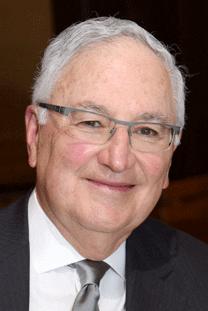
The Election of Directors and Office Bearers for the following year was held and some minor amendments to the Articles of Association were adopted.
The 2020 Board of Governors Meeting was to have been held from 12 to 17 June 2020. Due to Covid-19 this was postponed to 24 to 27 October 2020. The Meeting will now take place as a virtual meeting on 25-26 October 2020.
The bulk of the scholarship funds from which the
Australian Friends award student scholarships are held in Jerusalem by the University, which awards the scholarships based on our recommendation.
The Domansky Fund awarded $US5,521 between 7 students. $US1,153.89 remains in the Income Account.
The Yitzhak Rabin Scholarship Fund awarded $US16,450.70 between 11 students. $US742.30 remains in the Income Account.
The Henry Bialylew Endowment Fund awarded $US3,943.66 to 1 student. $US1,296 remains in the Income Account.
The Menasche Fund awarded $US1,126.76 to 1 student. $US36,833.24 remains in the Income Account.
No scholarships were awarded from the Sir Zelman Cowen Trust Fund.
The School of Psychotherapy conducts a 3-year program as well as a number of short courses and workshops on mental health issues in children and youth. The school also runs a 3-year post graduate psychotherapy training program for Arabs, Druze and Circassians. This is a unique program which is sponsored by the Ministry of Health.
The School of Therapeutic Interventions with the help of animals is the leader in the country in
this field and has international recognition. The school operates in collaboration with the School of Veterinary Medicine.
The Veterinary Nursing program is now running in 4 classes in parallel. The core program is run at the Veterinary Teaching Hospital of the Hebrew University, and three more classes are run at an agricultural boarding school in Petach Tikva. These classes are sponsored by the Ministry of Education.
The professional development division continues to work with government offices, local authorities and other public organizations. In addition to the established courses for individual participants such as, Chief Financial Officer training, Chief Information Security Officer training, Food Disorders treatment training, Startup managers training and International Cybersecurity executive training. The School has also introduced a series of online courses labeled “Skills in the Days of Corona” :-
(i) Digital Marketing,
(ii) Financial Management in times of crisis,
(iii) Remote management in a time of uncertainty and change,
(iv) Effective presentation in ZOOM
The Magid Institute in conjunction with the Daat Midbar Interdisciplinary Center for Desert Studies, has now established a desert studies project with a variety of workshops and topics. The workshops are for groups, organizations, institutions, both for elementary and high school students and also for individuals.
The Fund continued its work through 2020, despite the extraordinary events, which have created difficulties – most obviously for the academic and student exchange programs. Activities this year included the following:
The Sir Zelman Cowen Universities Fund Prize for Discovery in Medical Research is awarded in alternate years at the University of Sydney and at the Hebrew University of Jerusalem. The 2020 Prize ($20,000) was awarded to Dr Byrne for his discovery of UV-activated B cells, which is leading to breakthroughs in the understanding and treatment of skin cancer and multiple sclerosis. The Prize was sponsored by Schwartz Foundation.
The Sir Zelman Cowen Universities Fund Prize for Early Career Investigators in Medical Research is newly established; it is for the recognition of work by emerging medical scientists at the University of Sydney. It is designed to recognize achievement in medical research carried out at the University of Sydney by a scientist under 35 years of age. The Prize includes a monetary award of $10,000. This year’s recipient is Dr Lining Arnold Ju from the School of Biomedical Engineering, Heart Research Institute and Charles Perkins Centre. Dr Ju was chosen for his work on the development of the ‘Bio membrane Force Probe’ in the field of cardiovascular research.
The 2020 recipient of The Leslie Rich Scholarship For Dementia Research ($10,000) is Ms. Zoe Schrire, from the School of Psychology, for her project entitled Feasibility of 3 months Melatonin Supplementation of Brain oxidative stress and sleep in Mild cognitive impairment –a randomized Placebo Controlled Pilot study.
Due to Covid-19 pandemic the SZCUF Academic Exchange Program and the Roger Sebel Medical Elective Scholarships are on hold for 2020 and until restrictions are lifted.
During the beginning of 2020, one HU student visited Sydney (she completed the semester in July 2020), and one USYD student visited HU but she returned to Sydney when COVID-19 restrictions started and completed the program online from Sydney. The following projects were approved for 2020/21 and some have commenced:
Radio Astronomy project (HU) – this project is under way, with a year’s further funding available. 40th year SZCUF Doctoral fellowship grant. This is a new initiative. Approximately 20 one-off scholarships for masters and doctoral students, each with a value of $50,000, will be offered at each University, over the next two years.
The SZCUF contributed to Joint Research Workshop Grants, planned between Melbourne University and the HU in 2019. The commitment is for 3 years, subject to review.
Establishing a forum for Armenian studies at the Hebrew University (Prof. Reuven Amitai) – for the support of studies in this field.
The Jurisprudence of Joseph Raz. Funding was provided to Dr Michael Sevel (Sydney Law School) to study this Israeli scholar’s work in the theory of law. The Julius Stone Institute. Funding has been approved for two new initiatives:
The Julius Stone Professorial Fellowship in Jurisprudence, to enabling visiting scholars. A postdoctoral fellowship, initially for one year.
The SZCUF website, was reconfigured and relaunched earlier in the year.
The planned Mission for April 2020 had to be cancelled, due to Covid-19 and a Mission will be planned when conditions permit.
Efforts to reestablish the Victorian Division have been curtailed by Covid-19 particularly the travel restrictions to Melbourne that have been put in place.
I would like to thank all the staff for their commitment and dedication to the organisation during what has been an extremely difficult year. On behalf of the Board, as well, I particularly would like to commend Rob Schneider, our CEO, for his determined and continuing efforts to raise awareness of the University and communicate with donors in such a restrictive environment. I thank the staff also for their loyalty and service during these difficult times, in particular Moran Pitchon, our Project Manager, who continues updating the new database management system as well as the website, Yael Basserabie, our bookkeeper, who ensures the accounts are kept in order and Jamie Wise, our Student Liaison Officer, who handles scholarship applications and promotes scholarships through schools and universities.
I look forward to continuing to work with all of you so that the Australian Friends of the Hebrew University remains a vibrant group, providing significant support to the University. ■



(Note this Report relates to the year-end 30 June 2020)
This past year has been one without equals. Needless to say, the dislocation and stress along with the health concerns emanating from the pandemic has impacted everyone worldwide and our office and organisation has suffered the same as everyone else.
It is therefore with great gratitude that I wish to thank our CEO Robert Schneider and his assistants Moran Pitchon and Jamie Wise for their dedication in the course of our work in support of the University. Their efforts to maintain a functional office at a most difficult time has been impressive and has not gone unnoticed.
Unfortunately, many of our regular events have had to be cancelled and we like everyone else hope for
some normality in the not too distant future. This time however has enabled us to update our communication and data base systems with the end result being that we can now easily contact our supporters and have complete records.
It has also given us time to build a more personal relationship with many of our members and convey the needs and priorities of the Hebrew University. Hopefully when we do return to a more stable environment we will be able to relaunch our Honours Club and host a number of Hebrew University visitors to Australia.
In conclusion I would like to thank the Executive and the Committee Members for their continued support throughout the year. ■
Developing hardier, tastier cherry tomatoes, perfecting a citrus fruit to help prevent heart disease, providing cleaner safer water, increasing crop yields. The Hebrew University of Jerusalem spearheads innovative ways to eliminate hunger, make deserts bloom, improve the nutritional value of food and develop new varieties of products for the market. Graduate students from developing nations train at The Hebrew University and take their expertise back home. What began with sustaining Israel now benefits ou r growing world.
Make a positive contribution to feeding the world’s hungry and improving human health by supporting the Australian Friends of the Hebrew University. Call us on 02 9389 2825, or email austfhu@austfhu.org.au

The Hebrew University of Jerusalem
It’s big. And it’s clever.

Members of the WAFHU 2020 committee:
Peter Winterton, President
Hilary Winterton
Yael Jacobson, public relations officer
Lynn Swersky
Martin Brezger
Ken Budd
The committee met on one occasion this year in early March 2020, just prior to the declaration of the worldwide Covid 19 pandemic. There was agreement at this meeting as to our goals, and those our parent group the AFHUJ : Friend raising; with friends come funds
Fund raising
For scholarship.
For scholars. In WA this in the main is via the UWAHUJ exchange programme. At a national level Sydney office arranges other student exchanges with other Australian Universities.
Fund raising in WA, as elsewhere in Australia, is tough. Apart from a few generous benefactors to date we have not been able to raise big dollars in WA in recent years. In spite of this there had been a steady exchange of students about which we are very proud.
Achieving our goals is not an easy task especially in a small community like Perth, in a very troubled economic time. UWA dysfunction/restructure has not enhanced our position.
The planned visit to Perth of Hebrew University President, Prof. Asher Cohen did not take place due to the rapidly deteriorating world health crisis of Covid 19.
As with every challenge comes new opportunities. The changes in university course structure, using electronic means e.g. Zoom® and Teams® instead of face to face teaching will allow cheaper collaboration at a lower cost for exchange of ideas and knowledge between universities such as UWA and HUJ.
It would be remiss of me not to make comment about the once in a century opportunity that awaits the Perth Jewish Community. State and Federal governments have pledged significant funds for the rebuilding of the aged and out dated Jewish Community Centre in Yokine. I think all factions within the Perth community welcome this initiative. It will allow for better facilities to show case the community and foster intermingling of the various interest groups within the community in a contemporary environment.
The fact that currently in Perth both the Liberal and Orthodox communities are each led by a young able Rabbi is a great bonus for the strengthening of the community; with community resilience also comes support for other Jewish activities e.g. FHUJ.
Conclusion
I would like to thank Yael Jacobson for her efforts in 2020. There is no doubt that 2020 has been conspicuous by its complete lack of form. We are grateful to the ongoing support of our loyal WA donors of the UWA-HUJ scholarship fund. The rise in community use of technology will enhance working with the youth of our community in making WAFHU relevant to them in today’s world. ■
(Note this Report relates to the year-end 30 June 2020)
My 2020 Annual Report has been compiled during the Corona pandemic, one of the most difficult times we have ever encountered and of course, as with all organisations - and individuals too for that matter – the Australian Friends and indeed the Hebrew University has not been unscathed. Notwithstanding the unprecedented situation posed by the Covid-19 pandemic, teaching and research at the Hebrew University continued on campus where possible, otherwise via the Internet. The University operates in a manner that ensures that the health of faculty and staff members as well as students is not jeopardised in any way. Doctors and researchers at the University continue to work hard to defeat the pandemic and across the University, there are over 60 different active Covid-19 projects, which include studies to find a vaccine and cure for this scourge. Some good news during this difficult period was that the Hebrew University continued to display the excellence for which it is famous and in March, announced that the University’s Professor Hillel Furstenberg was to be awarded the Abel Prize, often referred to as the Nobel of Mathematics. A number of fascinating webinars were also held over the last few months on a variety of topics including of course Covid-19 and although the time was not conducive to Australian participants, the links to these webinars are able to be accessed via our website. With the advent of the pandemic, it was felt prudent to allow our staff to work from home, which was the
case for the months of March through to the end of June. I continued to come into the office each day although many offices in our building were closed. Despite the difficulties, during this difficult period, we were still able to produce a top class Year Book that, for the first time, was circulated in an electronic format. We also printed some hard copies for the benefit of supporters who prefer to hold something solid in their hands.
I would like to acknowledge the cooperation and support received from staff members and board members during this difficult period and together with the rest of the world, we hope and pray that this affliction will soon be something of the past and we can get back to normal interacting with people face-to-face instead of via zoom!
I express my gratitude to Michael Dunkel, Federal President for his ongoing support, wise counsel and stewardship of the organisation.
I am grateful for the support of all board members but in particular wish to thank the Treasurer, Robert Greenfield who has been a tremendous resource not just to the Friends, but also to me personally and his attendance in our office together with the bookkeeper every second week – or more often if needed – is greatly appreciated.
Vice President Philip Moses is our organisational memory and the man we all turn to for information regarding the past. Thank you Philip.
NSW Friends President Barry Joseph is also a

wonderful support, in particular with assessing Australian students, applying for financial assistance to study at the Hebrew University. In the last financial year, we have also ensured that our fundraising authorities are in place in all the states in which we operate.
In the financial year under review, the following staff members were in our employ Moran Pitchon who had previously served as Student Liaison Manager and then Data Base Manager, became Project Manager but still retaining responsibility for the data base. Moran is a most valuable resource and loyal and committed staff member who is active in virtually all areas of the Australian Friends.
Jamie Wise was appointed Student Liaison Officer on a part time basis in December 2018 and to date, has effectively fulfilled this role, in addition to various marketing responsibilities.
Yael Basserabie is our part time bookkeeper attending the office fortnightly.
Andrea Frankel was the Office Manager from October 2018 through to March 2020 when the position of Office Manager was made redundant.
In the last year, substantial upgrades in office infrastructure and support have been implemented in areas such as computers, cloud access, IT upgrades and security and workplace safety. In addition, we have recently moved our internet to NBN and also upgraded our telephone system.
The move from our old data base system, Summit (membership information) and Member Extra (financial information) to the more encompassing and modern thankQ system was completed in this financial year.
I am particularly grateful to Moran Pitchon for effectively driving and managing this process. The move to thankQ now enables access to all information on one data base – financial, membership etc. – by as many staff members as needed.
As mentioned earlier, Jamie Wise was appointed Student Liaison and Marketing Officer in December 2018. Prior to that, Moran Pitchon fulfilled this role and she continues to support and assist Jamie in this area. I acknowledge with thanks, the contribution of both of these staff members. We continue to reach out to Australian students encouraging them to embark on both short term and long term studies at the Hebrew University.
Marketing: Due to the Coronavirus pandemic, marketing this year focused on online courses at the Hebrew University, and Hebrew University news. Much effort was spent on promoting the Hebrew University through mainly social media but also at the MASA Virtual School Fair organised by the Zionist Federation of Australia. Our social media now runs on a schedule, and there are two news articles posted every week at a minimum, in addition to flyers for online courses. We have also been featured in the Australian Jewish News National Education Supplement.
Mishpatim Seminar: The ‘Mishpatim Seminar’ will be held online during January 2021. It has been great to see that the course is still being accredited by Australian Universities, and inquiries are still coming through.
Financial Assistance: 20 students received scholarships this year, with USD27,042 and AUD2,000 in total granted to these students. It’s important to note that 19 of the 20 that received financial assistance have completed their course (one is currently undertaking her course in person). We have also provided financial support to two Israeli Exchange Students who studied at the University of Melbourne (they have since returned to Israel due to COVID-19 and finished their studies online).
Statistics for 2019-2020: 76 Australian students went to HUJI (5 online, and 71 in person) between 2019-2020 as opposed to 91 during 2018-2019:
2 students from Special Interest Programs
5 students from Middle Eastern Studies
7 students from Hebrew & Ulpan Programs
12 students from Exchange & Study Abroad Programs
16 students from the Mishpatim Seminar
34 students from Biblical Archaeology & Dig
Scholarship funding:
This year, certain of our local donors were unable to continue their contributions towards scholarship funding due to financial pressures.
It is hoped that these donors will continue to support our scholarship program when business conditions improve.
On the positive side, two Perth families came on board in the last financial year contributing an amount of $5,000 each towards scholarships for Australian students at the Hebrew University – we are immensely grateful for this support from the west!
The Honours Club is a NSW initiative for supporters who meet in Sydney at the Waverley Public Library on the last Wednesday of the month in order to listen to a lecture or presentation from experts in a variety of fields. Sadly, due to Covid, we have been unable to host Honours Club meetings since March. We have maintained contact with Honours Club members as well as with rostered speakers and we hope that just as soon as regulations permit, physical meetings will be able to resume. We did a survey of Honours Club attendees to find out whether they might like to have virtual meetings via zoom but those who responded preferred NOT to have zoom meetings.
In line with the decision to change the period of ordinary membership of the Australian Friends from Rosh Hashana to Rosh Hashana, it was decided that Honours Club membership should run per calendar year i.e. from January through to December.
Once the pandemic is behind us, aside from the monthly Honours Club meetings in Sydney, we would like to introduce a similar concept in Melbourne.
Thanks to the generosity of an anonymous donor, we were to have launched our first ever all expenses paid trip to Israel in April for participants who would provide a specified minimum legacy to the Hebrew University in their wills.
Again, unfortunately due to Covid, the mission had to be shelved and at this time, whilst the pandemic remains a barrier to travel, we are unable to plan ahead for a Legacy Mission in 2021 until the situation becomes clearer.
The intention would still be to run our Legacy Mission at the same time as the British Friends run theirs.
The office in Sydney serves as both the Federal and NSW offices of the Australian Friends and provides resources and services nationally. Committee meetings are held every second month and where necessary, a Federal meeting is convened on the same date as a NSW committee meeting.
Following various visits to Melbourne, we have managed to establish a small steering committee to assist in the resuscitation of a Victorian branch of the Friends. This is very much ‘work-in-progress’. I would like to acknowledge the amazing assistance and support received in Melbourne from one of our Life Governors, Professor Leon Mann AO and indeed also from his wife, Leah Mann AM. Whilst we were unable to host a fundraising event in Melbourne in this last financial year, we were able to stage other events and meetings built around the visits of Professor Mona Khoury-Kassabri and Professor Ehud Cohen, again with the assistance of Professor Leon Mann AO.
In particular, the visit of Ehud Cohen was a great success with a series of meetings and workshops at University of Melbourne, culminating in a wellattended public event at Beth Weizmann.
Shop 67/17-23 Newland Street, Bondi Junction 02 9389 4389
9389 2825
We have a WA committee based in Perth and chaired by Ass. Professor Peter Winterton AM. This committee meets on a regular basis and enjoys the support of a part time PR Officer, Yael Jacobson. The 2019 Federal AGM was held in Perth last November and it provided our national leadership an opportunity to meet with the WA committee and supporters in Perth.
During the course of the AGM, a dinner was held to honour the longstanding support of Harry Hoffman AM and Mrs. Sylvia Hoffman.
THE FLOORING SPECIALISTS
Moore Park
Leon Waxman 9662 9832

We have been very selective in our advertising especially since the start of Covid. Nevertheless, we have chosen to be part of carefully targeted Australian Jewish News editions and supplements nationally (Melbourne and Sydney editions) e.g.


We have also agreed to partner with the Australian Jewish News in a promotion called “The Einstein It Show” designed to link the younger and older generations.
The Australian Friends Yearbook – in hard copy and electronic versions
Career Development Association of Australia (CDAA).
Mrs Karen Pisk Careers Counsellor
Following the AGM, I remained in Perth to meet with donors and to welcome and accompany Professor Ehud Cohen for a program arranged for his visit.
Skype Email karen.pisk kpisk@hotmail.com
As in Melbourne, Professor Cohen’s visit was a tremendous success culminating in an extremely well attended presentation by him at the Maurice Zeffert Home.
My Perth visit also resulted in a substantial injection of funds from two Perth families towards scholarships for Australian students wishing to study at the Hebrew University.
Aircraft & Aviation Specialists
Regular e-newsletters sharing the latest news from the Hebrew University with our supporters. Special greetings, sometimes with a news component, to mark a specific Jewish holiday or festival.

LEVEL 1, 5 KNOX STREET, DOUBLE BAY 2028 Tel: 02 9362 4222
Articles about the Australian Friends and the Hebrew University have been featured regularly in the local weekly, the Maccabean.
DR & MR S MICHAEL FRANKS
During the course the last financial year, our board took a decision to change our membership dates for ordinary members to run from Rosh Hashana to Rosh Hashana each year instead of a calendar year.
2/74 Castlereagh Street, Sydney, NSW,2000 Tel: 9299 2275
Queensland
DR LESLIE & MRS GI NNY GREEN & FAMILY
Whilst we do not have any Qld. committee as such, I have visited the community on the invitation of the NCJWA Qld. and JNF Qld. and given presentations in both Brisbane and the Gold Coast. We do enjoy the support of a Hebrew University alumnus who serves as a faculty member at the University of Qld.
DR MARK LEVI Cnr Oxford & Riley Streets, Darlinghurst, NSW Tel: 9283 1900
DR & MR S ANTHONY M SVED
DR & MR S HI LTON WASILEWSKY 187 Macquarie Street, Sydney NSW Tel: 9223 3244
Unfortunately, the 2020 Board of Governors Meeting that was to have been held in Israel in mid-June could not take place because of Covid. The Board of Governors took place via zoom on Sunday 25 and Monday 26 October Israel time. The next physical meeting will hopefully be the 2021 84th Board of Governors in Israel in May 2021.
Articles about the Australian Friends and the Hebrew University have been featured in the local monthly, SHALOM.
The President of the Hebrew University, Professor Asher Cohen was supposed to visit Australia in March this year but once again, due to Covid, this visit had to be cancelled. ■



Moran has been based in the National Office in Sydney for the last 6 years. Unfortunately for us, Moran and her family are returning to Israel mid 2021 and her presence will be sorely missed. We are grateful that Moran will still assist with some project work for the Friends so this is not “goodbye” but “l’hitraot.” In the meantime, we wish her well and thank her for her commitment and dedication to the Australian Friends – our loss is Israel’s gain!
Jamie Wise is our bubbly young Student Liaison and Marketing Officer. Jamie works from the National Office in Sydney. She joined us part time in late2018 after having assisted earlier that year as a student on a specific project. Who better to relate to student needs and aspirations than one who has been in that position herself! Jamie is also responsible for maintaining our website, our social media exposure and news releases.
Yael Jacobson is our part time PRO in Perth who ensures that the flag of the Hebrew University flies high in the west! Yael assists the WA Friends Committee, liaises with students in WA and is responsible for organising Friends events in Perth.



Joe Gelbart joined us on a parttime basis just at the start of covid last year to assist with data processing especially the maintenance and updating of our national data base. Joe normally works 2 days a week and we are grateful to have the benefit of his IT and communal organisation experience.

We strive to see further than what’s in front of us, and we take the time to look past the layers of complexity. As your business and accounting advisors, we seek to unveil the bigger picture –whether you’re starting up, scaling up, transforming, participating in a sale, merger or acquisition, or managing the post-sale phase. We focus on looking forward, solving the challenges and making the most of the opportunities as your business grows.
We are your partners for growth. If you’d like to find out more please contact, Partners of ESV on 9283 1666.

Everything we do stems from our core purpose: to help you on your journey as you grow.




Considered one of the most of the country’s most extraordinary restaurants, Quay has held three Chef Hats for twenty consecutive years under the helm of Executive Chef Peter Gilmore. Situated in the heart of Sydney Harbour, there is no finer place to celebrate your next special occasion.


Ph: (02) 8078 0888 info@alteris.com.au


Ellen, Michael and Hester Greenfield wish every success to The Friends of the Hebrew University
19 Rosebery Avenue Rosebery NSW 2018 www jet-ap com



The Australian Friends in Sydney was the first Jewish communal organisation to cater for retired professionals by providing a forum for monthly meetings with interesting speakers.
In February 1992, Warner Reed, then Director of the NSW Friends, suggested to the executive of the NSW Friends that a group for retired members of the Sydney Jewish community be established. The first meeting was held on Wednesday, 23 September 1992 at the Ritz Carlton Hotel, Double
Bay with the guest speaker being Mrs Marian Purvis who, together with her husband, the Hon. Justice Purvis, had recently visited the Hebrew University and were especially impressed by the medical research being carried out there. It had been decided a few weeks earlier that this group be called the “Honours Club” and from then on until this day with very few exceptions, the Honours Club has met every month for morning tea and to listen to erudite experts in various fields address the group that has varied in size between 25 to 50 participants.
Generally, a representative of the Australian Friends welcomes the speaker and attendees and provides a brief update on the Hebrew University prior to introducing the speaker who addresses the audience for some 40 minutes after which there is question time with the questions often promoting further stimulating input from the speaker concerned.
In recent times, the Honours Club has featured prominent speakers such as Dr Ron Weiser AM, former President of the Zionist Federation of Australia and Life President of the Zionist Council of NSW. Ron is an excellent commentator on all matters relating to Israel and his talks are always well patronised.
Dr. Rachael Kohn AO, a respected author and journalist has also been one of the Honours Club’s most popular speakers over the last few years and it is always a pleasure to listen to her interesting presentations.
Naturally, health is an area of interest for all of us and so another extremely popular speaker has been Scientia Professor Henry Brodaty AO whose topic of “Prevention and treatment of dementia” always attracts a full house.
The Honours Club has also featured the well-

known Ronni Kahn AO, founder of OzHarvest and one of our community’s most colourful and innovative personalities. Ronni’s charm and her OzHarvest story always captivate our audiences. As the Australian Friends increases its presence in other cities, we are hoping to introduce the Honours Club concept with relevant speakers beyond just Sydney. Support groups such as the Honours Club enable existing and new supporters


to become better acquainted with our activities and the amazing work being carried out at the Hebrew University and ultimately, it has even led to increased financial contributions towards projects as well as bequests. ■



In 2012, two universities each with a proud history joined in an historic partnership. The partnership commenced with joint research programs and following on this successful joint venture, the partnership has now been bolstered by the addition of a newly announced joint PhD track

The Joint Research Workshop Grants Program enables faculty members from both universities to hold joint workshops in order to foster mutual research. From 2014 to 2019, ten workshops were funded under this program, six of which were held in Jerusalem and four in Melbourne. They included such diverse topics as
“Bacterial Biology and Infection,” “3D Printing for Medical implants,” “New Frontiers in Emotion Regulation” and “From System Biology to System Agronomy,” among others.
With the advent of covid, the last physical workshops under the joint research programs took place in 2019. The first of these was during
a visit to Israel by Professor Ashley Bush of the University of Melbourne where he collaborated with the Hebrew University’s Professor Ehud Cohen in a joint research workshop entitled “Emerging Strategies to Relieve Proteotoxicity in Neurodegenerative Disorders.”
In October 2019, Professor Maya Tamir visited Melbourne to collaborate with Dr.Katie Greenway in a joint research workshop on “New Frontiers in Emotion Regulation.” Emotion regulation involves changing our current emotional state to match a desired emotional end goal. Much previous research on emotion regulation has focused on hedonic goals (e.g., “feeling good”) ignoring more instrumental goals (e.g., “performing well”).. Recent research from the University of Melbourne and the Hebrew University shows that up-regulating negative emotions (e.g., Tamir & Ford, 2012; Tamir, 2016) and down-regulating positive emotions (Greenaway & Kalokerinos, 2017) can result in effective and impactful behavior. This suggests that people sometimes need to feel bad to act effectively. (!!)
The Greenaway -Tamir workshop aimed at a deeper understanding of instrumental emotion regulation. Greenaway, Kalokerinos, and Tamir have now developed an Australian Research Council Discovery Project.
Professor Tamir’s visit included two days of workshop presentations and brainstorming sessions as well as a research seminar presented by Professor Tamir.
With the support of the Pratt Foundation, a Research Leadership Dinner was also held for the team involved with the workshop.
In November 2019, Prof. Ehud Cohen reciprocated Professor Bush’s visit to Israel by travelling to Melbourne to build on the collaboration started earlier that year when Professor Ashley Bush had visited Israel. This visit included a day of research discussions, a Research Leadership Dinner in University House at the University of Melbourne generously sponsored once again by the Pratt Foundation.
A public discussion also took place at Beth Weizmann on ‘Advances in the Treatment
of Alzheimer’s, Parkinson’s and other Brain Diseases” that featured Professors Cohen and Bush. The discussion was facilitated by Professor Leon Mann AO, of the University of Melbourne and a Life Governor of the Hebrew University and a co-founder of the Joint Research Workshops Program between the two universities. Professor Mann sums up the value of the partnership between the two universities - “When outstanding research leaders and talented students from the Hebrew University and the University of Melbourne meet to plan and discuss doing collaborative research, the creative juices flow and intellectual sparks fly…..I am exceedingly proud of the Joint Research Workshops Program between these two great Universities.”
The workshops planned for 2020 had to be postponed due to Covid-19 and will hopefully take place soon. These workshops are “Antimicrobial Peptides and their Applications,” which will be held in Melbourne and led by Dr. John Karas and Dr. Zvi Hayouka, and “Advancing the Science and Practice of Mobile and Ecological Cognitive Treatments Across the Lifespan and Neurocognitive Disorders,” which will be held in Jerusalem and led by Dr. Alex Bahar-Fuchs and Dr. Mor Nahum. The recently launched Jerusalem-Melbourne Joint PhD Program joins the Joint Research Workshop Grants Program in a further strengthening of the ties between the University of Melbourne and the Hebrew University of Jerusalem. The new joint PhD track enables outstanding doctoral students to benefit from the supervision of top researchers and complimentary expertise at both of these prestigious universities.
Justin Zobel said he was delighted that the new joint PhD program builds on existing research collaborations. “Our joint workshop funding has seeded collaborative research across the two universities and these relationships will now be strengthened through the joint supervision of outstanding graduate researchers.”
“We are thrilled to have launched the joint doctoral program together with the University of
Melbourne, which has now gained traction,” adds Prof. Oron Shagrir, Vice President for International Affairs at the Hebrew University of Jerusalem. “We have two joint research groups underway, and two more projects are slated to begin in the coming year. We anticipate that these projects will continue to attract exceptional research students and will further enhance the ongoing collaboration between our two institutions.”
The partnership now expanded with the launch of the Jerusalem-Melbourne Joint PhD Program is open to all academic fields. The new program involves doctoral students working together in a research group that is supervised by both Australian and Israeli faculty. Every year, the two universities jointly publish a call for applications for joint research projects, whereby pairs of researchers representing both the University of Melbourne and the Hebrew University together propose research projects for PhD clusters from both institutions. PhD students in the program are enrolled in both


institutions and are eligible to receive a PhD recognized by both universities. They must spend at least one year at the University of Melbourne and one year at the Hebrew University of Jerusalem.
In the program’s first year, 2019, two joint proposals were accepted, and research has already begun. The first proposal was in the field of cognitive neuroscience research and the work is being cosupervised by Dr. Hinze Hogendoorn , a Senior Research Fellow at the University of Melbourne’s School of Psychological Sciences, and Dr. Ayelet Landau , Assistant Professor at the Hebrew University’s Department of Cognitive Sciences and Psychology. One of the two PhD projects they are co-supervising investigates the role of brain oscillations in the mechanisms involved in predictive coding. The other PhD project investigates the actual information contained in each of the cycles of cortical excitability that
the brain produces during perception.
“For me, the UoM-HUJI joint PhD program provided a unique opportunity to set up a valuable new collaboration with a leading researcher in my field. With the mutually complementary expertise in the supervisory team, and two PhD students being jointly supervised, it also provides an opportunity to create a small but tight international research team to work together on a given topic,” notes Dr. Hogendoorn.
The second proposal accepted in 2019 is in the field of quantum diamond. The co-supervisors are Prof. Nir Bar-Gill of the Rachel and Selim Benin School of Engineering and Computer Science at the Hebrew University of Jerusalem and Prof. Steven Prawer of the Melbourne Materials Institute at the University of Melbourne. Profs. Bar-Gill and Prawer have been collaborating since they jointly organized a workshop in Jerusalem in February 2017 on the topic of quantum diamond. They are again joining forces in the Joint Doctoral Research Clusters Program to combine the expertise of both groups for the purpose of developing new bio-medical tools with far-reaching implications. One of the PhD students recruited for this project is Galya Haim, who started her doctoral studies at the Hebrew University and plans to travel to Melbourne next year.
“Through the Melbourne-HUJI joint PhD program, Steven Prawer and I have initiated a collaboration to pursue next generation quantum technologies for imaging and sensing at the micron scale in the context of biological systems. The project aims to combine the expertise of the Prawer group in diamond fabrication and device engineering, with the Bar-Gill group’s expertise in NV quantum sensing,” Prof. Bar-Gill explains, adding that, “I
see this program as an excellent opportunity to strengthen and expand the ties between the two universities, and to provide the highest level international scientific training and experience for our best PhD students. I look forward to visiting the University of Melbourne in the not-too-distant future through this program, to promote this project and hopefully further expand my scientific network.”
In 2020, joint research proposals were accepted for two more pairs of projects. In one of the joint groups that was accepted to the program, the Israeli side of the partnership is represented by Prof. Omri Abend of the School of Computer Science and Engineering and Department of Cognitive Science at the Hebrew University of Jerusalem, and the Australian side is represented by Dr. Lea Frermann of the School of Computing and Information Systems at the University of Melbourne’s Melbourne School of Engineering. Both are experts in Natural Language Processing (NLP) and Computational Linguistics. One of their research projects will focus on scalable
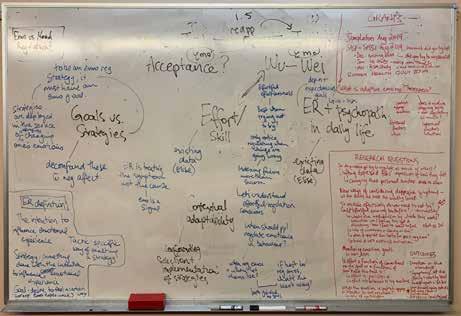
computational cognitive models of the bilingual lexicon – leveraging recent advances in machine learning and NLP and the availability of largescale naturalistic data sets of learner language in order to investigate the structure and development of the bilingual lexicon. The other project deals with cross-linguistic semantic and syntactic representation, and the goal is to make progress towards a definition of a semantic and syntactic scheme that can be applied consistently across languages.
The second joint research group whose proposal was accepted in 2020 will be co-supervised by Prof. Rebecca Traub of the Melbourne Veterinary School, Faculty of Veterinary and Agricultural Sciences at the University of Melbourne, and Prof. Gad Baneth , Director of the Koret School of Veterinary Medicine at the Robert H. Smith Faculty of Agriculture, Food & Environment, the Hebrew University of Jerusalem. Both are internationally recognized researchers in the field of veterinary parasitology, specializing in the diagnosis, treatment and control of companion animal and zoonotic vector-borne diseases, and they have collaborated for many years.
“Since many of these diseases are transmissible from animals to humans, they not only impact animal health, but also public health. The UoMHUJI partnership will provide an opportunity for one PhD student at each university to undertake a research exchange project,” notes Prof. Traub. The first project focuses on the development of nextgeneration molecular diagnostic tests capable of detecting all known and potentially new or novel tick-, flea- and biting fly- transmitted diseases of dogs and cats from clinical samples. “This newly developed diagnostic assay will be validated and applied to field settings in Australia and Israel as a biosecurity and disease surveillance tools to assist with early detection and mitigation of disease emergence in animals and humans,” she explains. The second project focuses on mapping and ascertaining environmental, tick-borne pathogen co-infection and drug-resistance related risk factors for Leishmania spp. in dogs and cats in Israel. “Leishmania spp. are zoonotic sand fly-
transmitted parasites that use dogs as primary reservoirs. The animal data will be correlated to ascertain association with the human incidence of leishmaniasis in Israel. Although exotic to Australia, Leishmania does pose a potential threat to establishing in Australia,” says Prof. Baneth. Although still in its infancy, the new joint PhD track has already generated a great deal of interest among researchers as well as doctoral students. Clearly, the synergy between these two top universities is amplified by the University of Melbourne–Hebrew University of Jerusalem Partnership, offering unique opportunities to advance research in a large range of fields.
The joint workshop program and other initiatives enjoy the generous support of the Australian Friends of Hebrew University. ■


For several years, the Hebrew University has been jointly excavating the site of Khirbet el-Rai in the Shephalah with the Israel Antiquities Authority and Macquarie University, Sydney Australia. The site has now been sensationally identified with the lost biblical city of Ziklag!
Behind the glory of discovery is another story – the impact the Australian Friends have been having on the lives of ordinary Australian students and high school teachers, broadening and deepening their understanding of Israel in remarkable ways.
Each year, the Australian Friends provide financial and logistical support to around 25 university students and high school teachers to go to Israel to do the Biblical Archaeology Course run by Hebrew University and/or take part in the dig run by Hebrew University.
By experiencing Israel firsthand, these students and teachers become the best advocates for the Hebrew University and the State of Israel. Rather than tell you, let’s hear it from them in their own words. This letter is from Edward Clancy. He is going on to undertake postgraduate study.
Dear Mr Schneider, I want to express my gratitude for the help I received from the Australian Friends of The Hebrew University in allowing me to travel to Israel to excavate at the site of Khirbet el’Rai. The trip not only allowed me to experience practically what being an archaeologist is like, but also allowed me to have a deeper understanding of Israel and its culture. I was left feeling humbled by the amazing people I met and the lasting friendships I made. The supervisors, volunteers and fellow students that partook in the dig from the Hebrew University all went above and beyond to ensure we felt safe and at home, as well as ensuring we learnt as much of the rich history as possible. One particularly special event that took place during a weekend trip, our tour guide organised for all the Macquarie University students to join a Shabbat service at her synagogue in Jerusalem. It was both a very welcoming and memorable experience.
The dig itself was a challenging but rewarding experience and I know that I have accomplished goals both personally and as part of a team. Moving forward this trip has solidified my interest in the field of archaeology, and truly given me the tools, knowledge and network to partake in future excavations. Again, thank you for the assistance and generosity given.
Kind Regards,
Edward ClancyHere is another letter from Neenah Gray, an indigenous student who has now been to Israel several times, the last time assisting with the running of the Biblical Archaeology Course. Neenah writes:

Dear Mr Schneider, I would like to thank you and the Friends for your kind generosity in providing me with a scholarship to attend the most recent Israel excavation at Khirbet el-Rai.
Studying Ancient Israel is my passion. Digging in Israel has been an amazing opportunity that I have now been able to do twice with the help of the Australian friends of the Hebrew University. I have come away with some wonderful new friends, as well as making academic connections through the Hebrew University, especially Professor Wayne Horowitz who has helped me personally. Israel is a place of comfort for
me where I am able to express myself both academically and culturally.
I hope that Macquarie University and the Hebrew University continue to have a pleasant and ongoing relationship to encourage students to engage with the history and culture that is present in Israel.
Kindest regards,
Neenah R. GrayProgram Director, Dr Gil Davis, who organises the fundraising and logistics of the dig and the weekend tours, had this to say: “I have to join in the thanks of the students and teachers to the Australian Friends. The dig would not be possible without this support. Nothing is ever too much trouble. It is a partnership yielding only good things”.
The last word comes from Rob Schneider, CEO of the Australian Friends. He said that “the Archaeological programs and digs so ably coordinated on the Australian side by Dr. Gil Davis are among the most exciting programs that the Friends can support and promote” adding that “the professionalism and commitment of Dr Davis has ensured the success of past programs and we look forward to many more groups of Australian students participating in the excitement of a ‘dig’ that could unfold secrets that students normally only dream about, but thanks to the Hebrew University and our supporters, we can now provide these students with the opportunity to be part of a real journey of discovery and wonder.” ■
The Australian Friends congratulates Professor Mona Khoury-Kassabri, who was our guest in Australia in 2019, on her ground-breaking appointment as Vice President for Strategy & Diversity at the Hebrew University.
During Prof. Khoury-Kassabri’s visit to Australia, the event at which she was the guest-of-honour was aptly entitled, “Shattering the Glass Ceiling” and included some prominent Australian women in a panel discussion that included Prof. KhouryKassabri and facilitated by Jillian Segal, AO, President of the Executive Council of Australian Jewry.
Yet again, Mona has ‘shattered the glass ceiling’ by this latest prestigious appointment, clearly demonstrating that there is just nothing stopping this extraordinary lady who was the first Arab woman ever appointed as a Dean of a faculty at a university in Israel - and possibly even in the entire Middle East - and now once more with her new role as a Vice President of the Hebrew University. As part of her new role, Khoury-Kassabri will be responsible for broadening the ranks of the university’s academic staff and student body with members from underrepresented communities in academia, including ultra-Orthodox Jews, Arabs, Ethiopians and people with disabilities. In addition, Khoury-Kassabri will be charged with implementing the university’s strategic priorities, among them raising the social, economic and environmental impact of the university,
increasing the cross-disciplinary efforts among the university’s six campuses and adapting teaching methods to the post-Corona period.
“Multi-culturalism and diversity are at the very heart of Hebrew University,” added Prof. Asher Cohen, President of the Hebrew University. “For this reason we made the decision to formally create a senior position at the university that will focus on implementing these principles and the strategy to get us there. Professor Khoury-Kassabri is the ideal candidate. She champions diversity without compromising on academic integrity or professionalism.”
On hearing of her appointment, Prof. KhouryKassabri said “I am deeply honored to be the first Arab to serve as a Hebrew University Vice
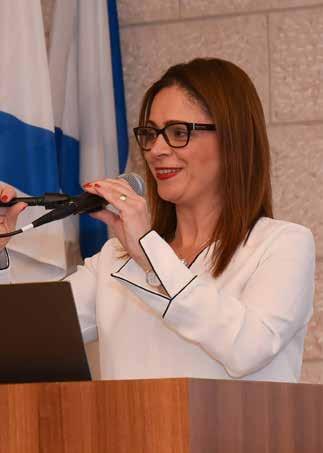
President. I feel confident that my experience both inside the classroom and in senior roles at the university will serve me well in promoting the strategic goals and inclusionary values of this great institution,“ Khoury-Kassabri shared. Currently, Khoury-Kassabri serves as dean of HU’s Paul Baerwald School of School of Social Work and Social Welfare and will hold that position until the end of the 2020-2021 academic year.
Michael Dunkel, President of the Australian Friends welcomed Prof. Khoury-Kassabri’s appointment saying that “just as Mona was an affable and effective guest of the Friends during her visit to Australia in 2019, we are sure that she will continue to serve the Hebrew University with distinction in her new role.” Mr Dunkel also commended the Hebrew University for being the first university in Israel to create a senior role to strengthen diversity and inclusion.
Rob Schneider, CEO of the Australian Friendswho was Mona’s host during her Australian visit and who has struck up a firm friendship with her - says “The Hebrew University has made a wise move in appointing such a dynamic and effective person as Mona to this new role as Vice President for Strategy and Diversity. I have no doubt that she will bring all her strengths to the fore in ensuring that the diversity and reach of the Hebrew University will flourish not only in Israel but in international forums as well.”

Khoury-Kassbari holds three degrees from HU’s School of Social Work and Social Welfare. She completed her postdoctoral fellowship at the University of Chicago and was a researcher at the University of Toronto’s Faculty of Social Work. In 2014, she was appointed Advisor to the President of Hebrew University to increase Arab access to higher education and served in key positions on various committees, including head of HU’s Steering Committee for Israeli Hope in Academia. In 2018, she was appointed Dean of HU’s School of Social Work and Social Welfare. Her areas of research are school violence, juvenile delinquency and cyberbullying. ■

In recent years we have repeatedly heard the terms impact investments, social investments, and ESG (Environmental, Social and Governance) investments. These terms all refer to a new direction in which the world economy is heading, especially in the last 12-15 years.
We are witnessing a real revolution. More and more investors (having started with young people) are interested in investing in line with their values. The desire is to direct their investments to channels that also have a social or environmental benefit to humanity. This will create a tremendous opportunity, which if we know how to take advantage of, can significantly improve our lives, our communities, and our planet for many years to come. Today, the focus is broader than “impact investments.” Rather, we are already talking about the concept of an “impact economy,” a system by which consumers, investors, and shareholders will challenge entrepreneurs and executives to show that they generate their profits in a manner that contributes to public good. In my opinion, impact economy consists of four main approaches:
1Impact Investments - in various and diverse investment categories (asset classes), including shares, real estate, contracts, and bonds, there are investments that look at the return - but also at the social impact of the investment. Some investors may be willing, for this purpose, to settle for a lower return and big impact, and others will seek market rate returns, but no less important – social/ environmental good. We should be able to offer both types of investors the right opportunities in which to invest.

2
- About a year and a half ago, in an extraordinary announcement by 181 executives of the largest companies in the US, they stated that they will no longer focus solely on the profit line for investors, but will move from shareholder management to thinking and stakeholder management. From now on, there will be a greater consideration for employees, customers, suppliers, and the community in which the company operates, not just the maximum return to shareholders.
Impact Business Management

3
- All of us, beyond being employees or managers, family members or community members, are also consumers. It is in our power to push the places and businesses from which we need to conduct business, to fairly promote social and distributive justice, solving social problems and avoiding the corruption of the planet. One of the examples we like to give concerns retirement. We all have (in accordance with Israeli law) pension savings. The vast majority of us do not know what our pension 2 Impact Business
Impact Consumption
Management - About a year and a half ago, in an extraordinary announcement by 181 executives of the largest companies in the US, they stated that they will no longer focus solely on the profit line for investors, but will move from shareholder management to thinking and stakeholder management. From now on, there will be a greater consideration for employees, customers, suppliers, and the community in which the company operates, not just the maximum return to shareholders. money is invested in. If we require fund managers who manage our money to be in accordance with the principles of impact or ESG and not invest in “bad” things, we can actually divert the world’s large money to impact. Revolutionary!
4Impact Accounting - This is a real revolution. Imagine that by reading companies’ financial statements, you could analyze not only their economic and financial performance but also the exact financial cost of their societal or environmental actions. A team of top experts in the field, headed by Prof. George Serafeim of Harvard Business School, are now leading the thinking and writing of new accounting and reporting rules that will make it possible to know the cost of a company’s operations in terms of impact and financial minds. For example, consider an airline that earns $800 million a year. After analyzing the economic impact of their actions on the environment, we understand that the company’s operating cost as
…The Globe: Impact Ventures are a key component in the 17 Sustainable Development Goals adopted by all United Nations Member States in 2015. The Goals (SDGs) have targets such as reducing poverty, increasing gender equality, providing access to clean and affordable energy, and creating more sustainable cities. Simultaneously, impact investors are looking to identify and invest in enterprises tackling these same targets.
…The Globe: Impact Ventures are a key component in the 17 Sustainable Development Goals adopted by all United Nations Member States in 2015. The Goals (SDGs) have targets such as reducing poverty, increasing gender equality, providing access to clean and affordable energy, and creating more sustainable cities. Simultaneously, impact investor s are looking to identify and invest in enterprises tackling these same targets.
…The Globe: Impact Ventures are a key component in the 17 Sustainable Development Goals adopted by all United Nations Member States in 2015. The Goals (SDGs) have targets such as reducing poverty, increasing gender equality, providing access to clean and affordable energy, and creating more sustainable cities. Simultaneously, impact investor s are looking to identify and invest in enterprises tackling these same targets.
…The Globe: Impact Ventures are a key component in the 17 Sustainable Development Goals adopted by all United Nations Member States in 2015. The Goals (SDGs) have targets such as reducing poverty, increasing gender equality, providing access to clean and affordable energy, and creating more sustainable cities. Simultaneously, impact investor s are looking to identify and invest in enterprises tackling these same targets.
…The Globe: Impact Ventures are a key component in the 17 Sustainable Development Goals adopted by all United Nations Member States in 2015. The Goals (SDGs) have targets such as reducing poverty, increasing gender equality, providing access to clean and affordable energy, and creating more sustainable cities. Simultaneously, impact investor s are looking to identify and invest in enterprises tackling these same targets.
… The World of Finance: The driving force behind the global Impact Revolution is Sir Ronald Cohen, a pioneering philanthropist, venture capitalist, private equity investor and social innovator. His ground - breaking initiatives have catalyzed global efforts to drive private capital to serve social and environmental good.
… The World of Finance: The driving force behind the global Impact Revolution is Sir Ronald Cohen, a pioneering philanthropist, venture capitalist, private equity investor and social innovator. His ground-breaking initiatives have catalyzed global efforts to drive private capital to serve social and environmental good.
… The World of Finance: The driving force behind the global Impact Revolution is Sir Ronald Cohen, a pioneering philanthropist, venture capitalist, private equity investor and social innovator. His ground - breaking initiatives have catalyzed global efforts to drive private capital to serve social and environmental good.
… The World of Finance: The driving force behind the global Impact Revolution is Sir Ronald Cohen, a pioneering philanthropist, venture capitalist, private equity investor and social innovator. His ground - breaking initiatives have catalyzed global efforts to drive private capital to serve social and environmental good.
… The World of Finance: The driving force behind the global Impact Revolution is Sir Ronald Cohen, a pioneering philanthropist, venture capitalist, private equity investor and social innovator. His ground - breaking initiatives have catalyzed global efforts to drive private capital to serve social and environmental good.
… The State of Israel: The Israeli Forum for Impact Economy serves as the local Israel National Advisory Board (NAB) within the international Global Steering Group (GSG) to accelerate an impact economy that will deliver social, environmental , and economic value and produce sustainable economic growth. Social Finance Israel is a social enterprise that promotes the flow of capital towards solving issues in Israel, through the use of innovative financing tools. As the first and only social investment intermediary in Israel, SFI is developing the Impact Investing sector with the ultimate goal of positively impacting the lives of citizens nationwide.
… The State of Israel: The Israeli Forum for Impact Economy serves as the local Israel National Advisory Board (NAB) within the international Global Steering Group (GSG) to accelerate an impact economy that will deliver social, environmental , and economic value and produce sustainable economic growth. Social Finance Israel is a social enterprise that promotes the flow of capital towards solving issues in Israel, through the use of innovative financing tools. As the first and only social investment intermediary in Israel, SFI is developing the Impact Investing sector with the ultimate goal of positively impacting the lives of citizens nationwide.
… The State of Israel: The Israeli Forum for Impact Economy serves as the local Israel National Advisory Board (NAB) within the international Global Steering Group (GSG) to accelerate an impact economy that will deliver social, environmental, and economic value and produce sustainable economic growth. Social Finance Israel is a social enterprise that promotes the flow of capital towards solving issues in Israel, through the use of innovative financing tools. As the first and only social investment intermediary in Israel, SFI is developing the Impact Investing sector with the ultimate goal of positively impacting the lives of citizens nationwide.
… The State of Israel: The Israeli Forum for Impact Economy serves as the local Israel National Advisory Board (NAB) within the international Global Steering Group (GSG) to accelerate an impact economy that will deliver social, environmental , and economic value and produce sustainable economic growth. Social Finance Israel is a social enterprise that promotes the flow of capital towards solving issues in Israel, through the use of innovative financing tools. As the first and only social investment intermediary in Israel, SFI is developing the Impact Investing sector with the ultimate goal of positively impacting the lives of citizens nationwide.
… The State of Israel: The Israeli Forum for Impact Economy serves as the local Israel National Advisory Board (NAB) within the international Global Steering Group (GSG) to accelerate an impact economy that will deliver social, environmental , and economic value and produce sustainable economic growth. Social Finance Israel is a social enterprise that promotes the flow of capital towards solving issues in Israel, through the use of innovative financing tools. As the first and only social investment intermediary in Israel, SFI is developing the Impact Investing sector with the ultimate goal of positively impacting the lives of citizens nationwide.
… The Hebrew University: The role of academia in training the next generation of impact investment professionals and cultivating evidencebased standards and practices is an integral part of a thriving Israeli impact invest ment ecosystem. The study of impact investing at Hebrew University’s Jerusalem School of Business Administration is at the forefront of academic research – creating best of breed data platforms, empowering decision makers with impactful executive education and leading pioneering projects in the most challenging business & social scenarios.
… The Hebrew University: The role of academia in training the next generation of impact investment professionals and cultivating evidencebased standards and practices is an integral part of a thriving Israeli impact invest ment ecosystem. The study of impact investing at Hebrew University’s Jerusalem School of Business Administration is at the forefront of academic research – creating best of breed data platforms, empowering decision makers with impactful executive education and leading pioneering projects in the most challenging business & social scenarios.
… The Hebrew University: The role of academia in training the next generation of impact investment professionals and cultivating evidencebased standards and practices is an integral part of a thriving Israeli impact invest ment ecosystem. The study of impact investing at Hebrew University’s Jerusalem School of Business Administration is at the forefront of academic research – creating best of breed data platforms, empowering decision makers with impactful executive education and leading pioneering projects in the most challenging business & social scenarios.
… The Hebrew University: The role of academia in training the next generation of impact investment professionals and cultivating evidencebased standards and practices is an integral part of a thriving Israeli impact invest ment ecosystem. The study of impact investing at Hebrew University’s Jerusalem School of Business Administration is at the forefront of academic research – creating best of breed data platforms, empowering decision makers with impactful executive education and leading pioneering projects in the most challenging business & social scenarios.
… The Hebrew University: The role of academia in training the next generation of impact investment professionals and cultivating evidencebased standards and practices is an integral part of a thriving Israeli impact investment ecosystem. The study of impact investing at Hebrew University’s Jerusalem School of Business Administration is at the forefront of academic research – creating best of breed data platforms, empowering decision makers with impactful executive education and leading pioneering projects in the most challenging business & social scenarios.
well as the environmental damage it causes produces a total cost of $1,200 million, so net it brings in a loss of about $400 million. This is a particularly powerful tool. It will allow us to analyze return / risk / impact on any investment, allow governments to accurately tax polluters (those who harm society) and avoid imposing such a tax on all citizens and most importantly - will allow necessary transparency on the making of companies in the world. In my opinion, in the coming years we will continue to see this trend toward impact investing intensify in the world in general and in Israel in particular. Israel is a world leader in social impact and innovation and has the ability to lead due to the existing technological excellence in the country. It’s my hope that we can continue to identify many solutions on a large scale for social and environmental problems in Israel and around the world, and create a lasting impact for future generations. ■

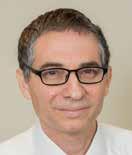
Universities can have a huge social impact - both as an educational institution and in serving society. But it’s not enough to feel that you are making an impact; one needs to collect and analyze data that shows how much of an impact one is truly making. Enter: social impact measurement.
Each year, the Hebrew University awards scholarships to students in-need. These scholarships provide financial assistance to approximately 1,500 students yearly. The scholarships are funded by private donors and government support. In order to examine the impact of the scholarships, the Hebrew University turned to Social Finance Israel (SFI) to cooperate in analyzing the economic and social impact of the investment in scholarships. SFI develops result-focused social projects in a variety of areas (education, employment, welfare, health, etc). Alongside this, SFI has gained extensive knowledge in conducting research linking social outcomes to economic returns.
Yaron Neudorfer is founder and CEO of Social Finance Israel, the first financial institution in Israel to issue Social Impact Bonds. He also serves as the Chair of the Israel National Advisory Board (NAB). He previously served as CFO of The Jewish Agency, the largest not-for-profit organization in the country, as well as in the Israeli Ministry of Finance. Neudorfer holds a BA in Accounting and Economics from The Hebrew University of Jerusalem, and a Master in Public Administration from The Harvard Kennedy School of Government.
Areas that will be examined include:
1. The socio-economic impact of the scholarship program on students and the Israeli economy.
2. Identifying opportunities to improve socioeconomic efficiency in the allocation of scholarship funds.
3. The number of graduates coming from peripheral areas and/or minority groups in the population, who were able to complete their academic studies thanks to scholarships.
Through this collaboration, it is our hope that by analyzing and evaluating the students who received scholarships over the past 10 years, we can gain a better understanding of their impact on Israel and the world. Stay tuned to future Scopus issues for results of this study!





In early Fall 2020, the Hebrew University’s Division for Advancement and External Relations and the Hebrew University Alumni Association organized a roundtable discussion on impact investing, which equally emphasizes capital returns and positive social or environmental impact. The panel hosted prominent Hebrew University alumni for a discussion on what drives them as impact investors and to share success stories, challenges, and opportunities. The panel featured Cecile Blilious, Head of Impact & Sustainability, Pitango Venture Capital; Yoel Cheshin, Chairman & Founder, 2B Group; Sandrine Montsma, Managing Partner, Bridges Israel, Yaron Neudorfer, CEO, Social Finance Israel.
Moderator: Dr. Dan Marom, Faculty member at the Hebrew University’s Jerusalem School of Business Administration and Head of the Impact Investing Institute.
Marom: I see impact investing as the alignment of capital with values, and I hope that our conversation will inspire members of our audience to become impact investors. Could you share your personal journey to impact investing?
Blilious: In the early 2000s I was managing the Noaber Foundation’s Israeli investments, thinking about ways to bring together values, capital, and tech. A decade later, I founded Impact First Investments, Israel’s first impact investing company. Today I am at Pitango, Israel’s largest venture capital fund, where I incorporate impact investing into general venture capital. This is the future – scaling impact investing through mainstream investments. Montsma: Until recently, my career had been in private sector management. In 2016 an acquaintance, who is now my business partner, called and asked if I’d heard about impact investing. I hadn’t. He sent me some information and asked me to meet with Sir Ronald Cohen [a pioneer in impact investing –Scopus] in London the following week. Sir Ronald
Cohen spoke to my deepest values and common sense. I kept thinking, “Of course! That’s where I want to be!” In 2018 I co-founded Bridges Israel, which invests in Israeli companies that serve the socio-economic periphery and in Israeli technology companies that generate global impact. Bridges Israel is both a private equity and a venture capital fund, and has made 10 investments to date.
Neudorfer: Unlike Sandrine, I was in the public and third sectors. I worked for the Ministry of Finance and then served as the Chief Financial Officer at the Jewish Agency. I realized we were dealing with a new type of donor. They don’t just write a check –they think like investors. They want to see what their marginal dollar is doing for the beneficiary. In 2012
Sir Ronald Cohen recruited me to serve as CEO of Social Finance Israel (SFI), the first social investment house in Israel. I also chair the Israeli National Advisory Board on Impact Investment, which brings together major players to advance the impact movement.
Cheshin: I was teaching philosophy and law, and my brother was in finance. I’d always wanted to go into business with him, but he refused. When he was tragically killed in a car accident, I founded the 2B Group, which stands for two brothers. I started with 2B-Angels, a high-tech venture fund. I also wanted to get more money to philanthropic causes without relying on the goodwill of donors – NGOs that protect basic human rights shouldn’t have to beg for money. So I founded 2B-Community. I still saw business on a sliding scale, based on the degree of success. We recently launched Israel’s first municipal social impact bond to help isolated seniors during the Coronavirus lockdown in Tel Aviv. Visiting volunteers will create the capacity for seniors to access municipal services and teach them to use technology to communicate. We will measure this program’s immediate and long- term impact on the seniors’ lives.
Cheshin: My example is Centrical, which is part of 2B-Angel’s portfolio. It’s a company that uses gamification to enhance the performance of corporate salespeople. You might ask: Sales? Corporations? Impact? The company believes in
helping employees become the best they can –employees are at the center. and philanthropy as separate. But when I became a member of Toniic’s 100% Network, pledging all of my own capital to net positive impact, I went back and looked at 2B-Angel’s portfolio and realized that although I’d invested in them as regular businesses, most of them, from my point of view, were impact investments. It’s a matter of spirit.
Marom: I find that the best way to inspire people, to bridge the gap between intention and action, is to focus on a specific example. What project are you most proud of?
Neudorfer: I have a recent example – from social services. Currently, national or local governments issue tenders, distribute funds, and hope it all works out. SFI does things differently: the social impact bond, or the “pay for success” model. Investors fund projects that have specific, pre-defined criteria for success. If met, the government returns the investment with interest
The company’s services enable employers to invest in the employees’ performance, help them learn and engage, and prevent alienation. Any business that has human-centric goals, or has a conscience, is, in my mind, impact.
Blilious: My example is from tech: Via, an Israeli ride-sharing company that creates affordable and accessible public mobility solutions around the globe. They enable people without access to cars or regular transit to reach jobs, healthcare, education, and more. Via offers a solid product, a solid solution, and a solid business plan. They are data-driven, and we can measure their impact – less pollution and traffic.
Montsma: I knew Cecile would bring a tech example, so I’ll offer one that’s quite different. Ibrahim Nsasra is a Bedouin (and an HU alumnus) whose children came home from school hungry one day – they’d refused to eat their school’s lunch. Ibrahim discovered their meals were prepared by a Jewish caterer whose menu was foreign to Bedouin culture. He hired four Bedouin women and arranged with the Ministry of Education for them to provide meals. Today, Nazid Impact Food employs 100 Bedouin men and women, providing
them with income, opportunity, and growth, while also feeding over 20,000 Jewish and Bedouin kids a day. His company constantly receives top reviews, and his catering business is one of the most profitable in Israel. This was also the first, and I hope not last, private equity investment in Israel’s Bedouin community.
Marom: Our audience might think that impact investing sounds too good to be true. Could you share any gaps or obstacles that you think might be preventing impact investing from becoming mainstream?
Neudorfer: One challenge is the role of government. In 1993, the Israeli government decided to invest in high- tech, using public money to attract private investors – and today we’re the Start-Up Nation. The government should encourage the market to play a role in impact investing. We’ve seen some slow progress, such as the Commissioner of Capital Markets requiring institutional investors to disclose whether they have an environmental, social, and corporate governance (ESG) or impact policy. In recent months, the state has provided Coronavirus relief funds to businesses – a combination of loans and grants. The government could determine social or environmental criteria, and businesses who meet the criteria would have their loans converted to grants.
Cheshin: Every investment should bring value. But I take a different approach to measuring value. “Social businesses” may offer returns lower than market- rate, while still creating social value. We’ve invested in Ogen, which gives 3% loans to people who do not qualify for bank loans. And some corporations don’t even measure their impact yet still move humanity forward. Mobileye knows that the more it sells, the more lives it saves. Impact investing is slowly changing the world. The CEO of BlackRock recently said that his investment management company will begin considering social values. I look forward to the day when there isn’t a distinction between impact and non-impact investing.
Montsma: The biggest challenge in the Israeli market is the institutional investors who hold most of the public capital – pension funds and insurance
companies. Managers of these funds always ask, “Why should I care about the environment? My duty is to maximize returns.” But around the world, fiduciary duty is understood more holistically. As one Dutch pension fund CEO said, “How can I invest in a polluting company that will make my customers pay higher taxes in 20 years?” Yaron mentioned the Israeli National Advisory Board. We’re all members. One of our main objectives is to increase awareness of the need for capital among companies who are creating social and environmental value.
Blilious: I used to hear, “If you want business, talk to me in numbers. If you want philanthropy, talk to my family foundation.” Impact investing was perceived as risky – and no facts could change people’s minds. As a regular venture capital fund, Pitango cannot compromise on returns. At the same time, social impact must be quantifiable – you need to measure something. We also need to ensure that large, successful companies are mission-aligned, accountable, and transparent about their impact. This will help debunk myths about compromises or tradeoffs. Ultimately, I’m encouraged by the numbers: Over the last 6-7 years, the impact investing market has doubled in size – annually.
Marom: How does your time at the Hebrew University relate to your activity as an impact investor?
Cheshin: I studied and taught Philosophy and Law at the Hebrew University and was sure I’d eventually become a professor. I especially love Milton Friedman (American Economist). I’ve applied two concepts from philosophy and corporate law to impact investing. A corporation is an entity, just like a human being. Each is made up of different parts, divisions, teams, and organs. The more these are coordinated, the more capable the larger body will be. This has nothing to do with morality – a holistic approach increases effectiveness.
Blilious: I was a terrible high school student, and the Hebrew University was the first place that taught me to put my curiosity to good use. The University opened my mind and paved the way to continue learning throughout life. This has helped me throughout my career, enabling me to think
about things differently.
Montsma: Unlike Cecile, I was a good high school student, and was planning on becoming a nuclear scientist. I eventually studied economics at the Hebrew University, an experience that influenced my entire career. Besides opening the door to management, my time at Hebrew University enabled me to understand the connection between impact investing, basic economics, and values. It had a great impact on my career.
Neudorfer: As a student at the Hebrew University, I saw many of my peers, very bright students, drop out because of financial hardships. This experience was in the background when SFI launched its first social impact bond to reduce drop-out rates of Computer Science students, which has been quite successful.
Marom: One of my goals in holding this roundtable is bridging intention and action. Not only sharing ideas with our audience but helping them transition into taking action. What message do you have for our readers? How can they become impact investors?

Blilious: So many people want to meet and learn about impact investing, but I simply don’t have enough hours in my day. I founded the Global Impact Tech Alliance, where impact practitioners can connect with each other, train others in a scalable way, and present more opportunities to take action and enter the impact investing market.
Neudorfer: My advice is simple. Next time a representative of a financial institution tries to lure you with slightly lower management fees, simply ask whether they have an impact investment plan. If so, promise to transfer your entire account, because you want your money to be doing good. If they don’t, request that they create such a plan. Montsma: Not everyone will become an investor. But the Hebrew University can nurture other aspects of the impact ecosystem, by making sure everyone understands its basic principles: do good, avoid doing harm. Doctoral students can research questions that will advance the impact economy, or alumni working for the Ministry of Finance can incorporate impact considerations into budgets. Impact can, and should, be part of alumni’s lives, no matter what they do.
Cheshin: My advice is to better understand business. Most of my meetings start off with dreams about changing the world. But it’s not enough to have a philanthropic heart; you need to understand the world, business, and how things work. This is how impact investing can outgrow its niche.
Marom: Thank you for participating in this inspiring roundtable discussion. Your different perspectives have been greatly enlightening. ■
Readers are invited to view the roundtable discussion at campaign.huji.ac.il/roundtable







STUNNING SUSTAINABLY PRODUCED DISPOSABLE PAPER TABLECLOTHS, RUNNERS & PLACEMATS.








OUR FULL RANGE INCLUDING KIDS PARTY CLOTHS ARE AVAILABLE ON OUR WEBSITE.
WWW.TABLEWEAR.COM.AU

WE CAN PERSONALISE FOR ANY OCCASION.

Extraordinaire and world renowned Bioengineer is to visit Australia in December as a guest of the Australian Friends of the Hebrew University
The Australian Friends of the Hebrew University is hoping to bring Professor Ya’akov Nahmias, a world renowned scientist and professor of Bioengineering at the Hebrew University to Australia later this year to share firsthand with Australian audiences his amazing contributions to human health and science in general.

Most recently, Professor Nahmias led a team of researchers in introducing a new technological approach that has the potential to rapidly develop
new drugs without the need for animal experiments. According to Professor Nahmias, “Drug development is a long and expensive endeavor that is defined by multiple failures. The main reason for this failure is that clinical experiments are ultimately based on minimal information gained from animal experiment which often fail to replicate the human response.”
The primary animals used in drug development are rodents; mice and rats with different genetics,
physiology and metabolism than humans leading to a situation where successful therapies in rodents often fail in clinical trials.
The Hebrew University team developed humanon-a-chip technology, using human tissues in a device, which mimics human physiology. While this type of technology has been in place for over thirty years, Professor Nahmias’s research recently published in the Science Transitional Medicine incorporating microscopic sensors in the human tissue itself enabling the team to precisely monitor the body’s response to specific drug treatments. “What makes our technology unique is that it allows us to go beyond what was ever possible with animal experimentation. We are now able to insert microsensors that offer us real time information on how drugs work and when they stop working,”
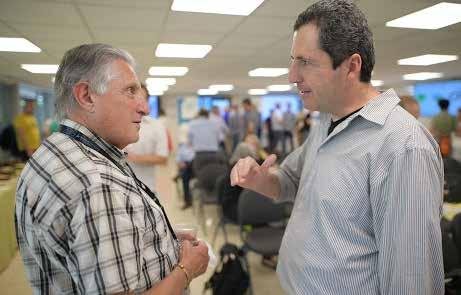
Professor Nahmias says.
Utilizing this new technology, the researchers were able to show that a the commonly used cancer
drug, cisplatin, causes a dangerous buildup of fat in human kidneys. They were then able to combine this chemotherapy with a different drug, empagliflozin (Jardiance), designed to limit the absorption of sugar in the kidneys, to reduce the fatty buildup damage and minimize the kidney damage experienced by cancer patients during therapy.
This application represented the first time that the bionic chip was used to develop a drug protocol while avoiding the traditional dependence on animal testing. “This groundbreaking technology has the potential to significantly reduce the testing and production time for drugs while also avoiding the need to test animals in the lab. This will save time, money and certainly unnecessary suffering. But chips are not all that concern Professor Nahmias as he rises to MEET THE CHALLENGE OF MEAT SUPPLY …………………..
Meat has been an integral part of our culture since the dawn of humanity. We crave meat, celebrate it,
but its production is becoming unsustainable. Animal agriculture utilises over 80% of the world’s habitable land, 30% of our freshwater supply, and is a major driver for deforestation. Growing population and dietary changes are predicted to lead to scarcity and escalating prices. With the assistance of the Hebrew University’s innovation and technology transfer arm YISSUM, Professor Nahmias has been integral in the establishment of Future Meat Technologies which meets this challenge by advancing a costeffective solution for cellular agriculture, that is scalable and sustainable by design. Future Meat Technologies animal-free meat does not compromise on nutritional value, aroma or flavour. Future Meat Technologies ground-breaking process starts with GMO-free animal cells that grow indefinitely without animal-derived components. Cells are grown in patented bioreactors that can replace barns, chicken coops and meat processing factories. Products are indistinguishable from animal-based meat.This distributive technology is sustainable and cost-effective, and due to rapid growth cycles, it allows producers to rapidly adapt to changing market demands.
Future Meat Technologies immortalize animal cells without genetic modification, making its cell source uniquely GMO-Free. The company’s cells show fast growth, doubling in mass every 24 hours. Thus, the manufacturing process lasts only two weeks allowing producers to rapidly change chicken, lamb and beef production within a few weeks’ notice.
Future Meat Technologies patent-pending method to grow cells in suspension, without carrier beads, enables 40-fold higher production yields. Our unique rejuvenating bioreactor design drastically reduces the volume of feed media used in manufacturing by 20-folds, by eliminating waste products radically reducing costs.
And it doesn’t end there. Professor Nahmias’s contributions to science during covid also merit sharing with our readers including recent research as to whether a simple drug, that has been on the market for decades could be used to treat COVID-19.
In a recent study led by Professor Nahmias, a wellestablished existing drug was applied to address the buildup of fats in human lung cells caused by the SARS-CoV-2 virus. Initial lab-based results and new data from 1,500 Israel-based Corona patients have been extremely promising and clinical studies are taking place at Barzilai Hospital in Ashkelon, Israel, joining other clinical centers across the United States, South America and Europe. The study began in July 2020 when Professor Nahmias demonstrated that the SARS-CoV-2 virus was inhibiting the effective breakdown of fat within the lungs. His research then identified the efficacy of Fenofibrate (Tricor), an FDA approved drug that has been on the market since 1975 to address this deficiency in Corona patients. The drug is traditionally designed to address high levels of triglycerides (fats) in the blood. When applied to Corona patients, the study proposes that it will stop the progression of the disease.
“We knew that the system we had developed
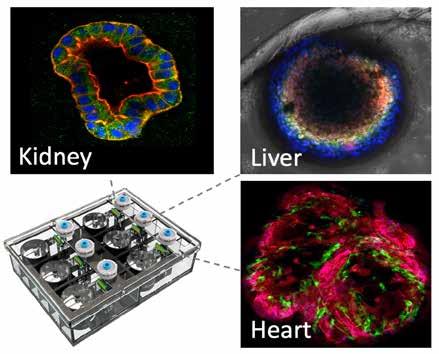
for Tissue Dynamics provided us with a unique vantage point to understand how the virus operates in the lungs,” Professor Nahmias explained. After discovering the efficacy of the drug in the labsetting, Professor Nahmias, together with Professor Oren Shiboleth of Ichilov Medical Center in Tel Aviv and Dr. Sigal Shafram-Tikva at Hadassah Medical Center in Jerusalem, worked to gather data from 1,500 Corona patients who were on a regiment of drugs designed to reduce the fatty buildup in lung cells.
The results were abundantly clear. Patients who were taking the drugs to speed up the breakdown of fats were recovering from the Corona-caused lung infections in a matter of days. The evidence even showed that there was zero mortality among these patients.
“We showed that the human lungs responded to the SARS-CoV-2 virus by completely changing their metabolism, causing a major buildup of fats in lung cells. Our findings show that this unhealthy fat buildup is a critical factor in COVID-19 patient’s deterioration. Patients taking fibrates that work directly to breakdown fats recovered fast from the disease, while those taking medications that
build fats like thiazolidinediones, showed greater lung damage and mortality,” Professor Nahmias explains.
According to the research team, applying the use of this established drug, which is widely available, inexpensive and has a proven safety record, could alter the effects of COVID-19 from a devastating disease to a far more manageable form of a respiratory cold.
The Australian Friends of the Hebrew University look forward to welcoming Professor Nahmias to Australia later this year. ■
Prof. Ya’akov “Koby” Nahmias is a bioengineer and innovator, whose breakthroughs ranged from the first 3D printing of cells to the first commercial human-on-chip technology. He is a Magna Cum Laude graduate of the Technion, Israel Institute of Technology, and is the founding director of the Grass Center for Bioengineering of the Hebrew University of Jerusalem. Nahmias is a recipient of a NIH career award, two European Research Council (ERC) grants, the Kaye Innovation Award and the prestigious Rappaport Prize in Biomedical Research. He is the first scientist outside Britain to win the Rosetrees Trust Prize. Nahmias is the co-founding director of BioDesign-Israel. An entrepreneurship program that educated over 120 fellows, raising $3M in investment and 10 startup companies including Guide In Medical, CardioVia and VenoVision. Nahmias is the founder and CSO of two biotechnology startups, including Tissue Dynamics that is developing a groundbreaking humanon-chip instruments for drug development, and the Tyson Foods-funded Future Meat Technologies focusing on the costeffective production of cultured meat.

Scopus talked to Hebrew University Rector, Prof. Barak Medina, and the Dean of Students, Prof. Guy Harpaz, about ways in which the shutdown of the campuses and the transition to remote learning challenged the students’ academic experience and services normally provided by the University – and how these proved to be an opportunity to increase outreach, think creatively, and show compassion towards our students.
Scopus: In mid-March, the University transitioned to online learning. How did this affect the experience and needs of Hebrew University students?
Medina: The most significant change was that students no longer had face-to-face contact, preventing them from meeting, studying together, and supporting each other. Of course, the transition to remote teaching/ learning wasn’t easy, it was an entirely new experience for students and faculty alike. In addition, students lost their incomes because typical student workplaces, such as restaurants and bars, shut down. Harpaz: This crisis has challenged our students academically, financially, emotionally, and socially. My office provides many different services, and we’ve been learning how to adapt them to current times. It’s not enough to have the best students and faculty – we also need to provide them with the best support. This is a delicate balancing act – helping students succeed without sacrificing academic standards.
Scopus: What are some specific challenges that students faced, and how was your office able to help students throughout this crisis?
Medina: We postponed the Spring 2020 semester
by a week and required that all faculty undergo pedagogical and technical workshops to prepare them for remote teaching. Although the transition to online teaching was rapid, we had an excellent and smooth semester. On the financial front, the University management established an emergency relief fund. Through the financial aid unit within Guy’s office, we distributed funds to nearly 1,000 students who were negatively impacted by the crisis and shutdown. We continue to raise money and are helping more students than ever before.
Harpaz: One of the most demanding challenges was providing academic support to struggling students. In ordinary times, counselors drop in on first-year courses. As Barak said, these in-person encounters couldn’t take place. We reached out to two sectors who were at a heightened risk of dropping out: students from a lower socio-economic background and firstgeneration students. We maintained our tutoring services – entirely online. In addition, we encouraged academic units to accommodate students by offering more dates for assignments and exams. Besides the funds Barak mentioned, we were also able to provide
discounts and payment plans for the dormitories. On the emotional front, we continued offering psychological services to all students – including the intake of new cases. We created a website where students could leave their details and a therapist would call them back within a few hours. Lastly, to enable students to connect and learn, we provided NetSticks to increase internet connectivity, lent out laptops, and even helped particularly needy students purchase digital equipment.
Scopus: Looking back at the Spring 2020 semester, how do you define success?
Harpaz: As head of the Israeli Forum of Deans of Students, I know that the Hebrew University was more generous and more accommodating than other academic institutions. But I think it’s best to listen to the students. We conducted surveys of the entire academic year and individual courses; in the annual survey, general satisfaction rose. That’s not to say there weren’t difficulties and that there isn’t room for improvement. But students had a positive experience. There was no increase in the number of students requesting to withdraw. This indicates students’ confidence in their abilities, as well as the University’s ability to help them succeed. Medina: Besides the surveys that Guy mentioned, we can compare grades across years in any given course. Student performance was similar to previous years – indicating that students succeeded in learning. Another measurement of success is looking ahead at the 2020/21 academic year. Student enrollment has risen, and the dorms are fully booked. Students are voting with their feet; they trust the Hebrew University to provide them with a positive experience while adhering to the highest academic standards. Scopus: You’d mentioned room for growth. What challenges still lie ahead?
Harpaz: We need to develop ways to better help students with learning disabilities. The same barriers to online learning exist for online support.
We’ve acquired a computer program that converts text to audio, and hope that it will increase accessibility for students with learning disabilities. Medina: One central challenge we faced is exams. Where would they take place? How would they be administered and graded? During the Spring 2020 semester, some courses were graded pass/fail, largely due to this challenge. Yet this crisis has presented an opportunity to make overdue changes to our pedagogy – introducing creative teaching methods, project- oriented learning, group projects, and more. I see this as an evolution of our teaching, not a revolution.
Scopus: How has this crisis provided you with an opportunity to grow and serve students better in the future?


Medina: We fully realize the importance of welcoming students back on campus, while also allowing for greater flexibility. We’re constructing ventilated study tents replete with outlets and Wi-Fi for students to meet, study in groups, or participate in online classes. Of course, in-person courses will also be broadcast online. We’ve invested in and upgraded the Wi-Fi infrastructure across our campuses and dormitories. Lastly, we’re excited to offer a few dozen joint courses with universities abroad – allowing our students to have an international experience. I see these as a prelude to studying abroad, when that becomes possible again.
Harpaz: I find assurance in the numbers, which show that not only did we help our students stay afloat, but they managed to swim. The incremental improvements clearly indicate our ability to provide even better services when things return to normal. I’m proud that we are continuously identifying creative ways to help our students succeed during a pandemic – without compromising our academics. The world knows the value of a Hebrew University diploma, and we must adhere to the highest of standards. ■
Prof. Yaakov "Koby” Nahmias (Bioengineering) looked into how the virus affected lung cells and discovered that it shut down the cell’s ability to burn fat – leading to optimal conditions for its own reproduction.
Using Tissue Dynamics technology, Nahmias discovered that drugs from the fibrate family, ordinarily used to lower triglycerides eliminated viral replication. More recent clinical study showed that COVID-19 patients who were taking fibrates were protected from the respiratory damage induced by the virus.
Nahmias’s findings are currently undergoing Phase 3 clinical studies in the United States, South America, Europe, and Israel – a scientifically crucial step in translating this finding into a safe and effective treatment for COVID-19 patients.
Dr. Naomi Habib (Edmond and Lily Safra Center for Brain Sciences) and Prof. Nir Friedman (Life Sciences & Computer Science) have made two significant contributions to the process of Coronavirus testing.
First, they developed an efficient and low- cost
scale testing, using DNA sequencers (rather than the standard PCR machines). By attaching a small DNA barcode to each sample, it becomes possible to combine hundreds or even thousands of swabs in a single test tube, while accurately determining which individuals test positive for the virus. Individually and combined, these discoveries have the potential to efficiently, accurately, and rapidly, identify infected people through mass testing –enabling the re-opening of the economy while maintaining public safety.

Prof. Ofer Mandelboim (Medicine), working with the Israel Institute of Biological Research, has discovered a way to prevent Coronavirus infection, which has proven very effective in cell cultures and in mice.


Infection occurs when the Coronavirus spike protein binds to the ACE2 receptor (proteins) on our lung cells, securing their entry into the cells. Man delboim injected mice with the actual spike and

ACE2 proteins, thus simultaneously inhibiting the virus from binding to the cells and also blocking their only way in. Looking ahead, Mandelboim hopes that these proteins will be mass-produced and tested on humans. Although it cannot be patented, this method has the potential to save millions from infection, illness, and death.
Dr. Shahar Arzy (Faculty of Medicine) is a cognitive neuroscientist. Working with PhD student Mordechai Hayman, he set out to understand ways to help the elderly, chronically ill, and immunosuppressed cope with isolation resulting from social distancing. They used fMRI scans to understand how our brains relate to our close friends and family, our wider circle of acquaintances, and celebrities. They found that while celebrities are the farthest, there are not significant differences between our immediate and wider circles of friends – any face-to-face contact is beneficial. In addition, he emphasizes the importance of tangible objects, such as a grandchild’s art project sent via the mail. Arzy is now working on an app that will map and quantify social networks, optimizing engagement and minimizing isolation ofvulnerable individuals

Prof. Micha Asscher (Chemistry), Prof. Amir Sa’ar (Physics), and Prof. Ofra Benny (Pharmacology) are developing a porous silicon-based patch for medical professionals to insert within their
protective face visors or masks. Optical tools can instantly reveal whether the pores, whose size can be adjusted to precisely that of the Coronavirus (or any other object of interest), have captured any nanoparticles. If so, the wearer can get tested for the virus immediately. The researchers plan to develop a secondgeneration patch with more specific diagnostic capabilities – eliminating the need to wait 2-3 days for test results before returning to work.
Prof. Meital Reches (Chemistry) is developing a spray that can be applied to surfaces, rendering them anti-viral. Treated surfaces would kill the virus, reducing transfection through door handles, faucets, and banisters in hospitals, trains, supermarkets, and elsewhere. This spray is based on an existing coating Reches developed that prevents the growth of fungus, yeast, and bacteria. The spray adheres to glass, metal, and plastic surfaces thanks to DOPA – the amino acid that helps mussels “glue” themselves to rocks.

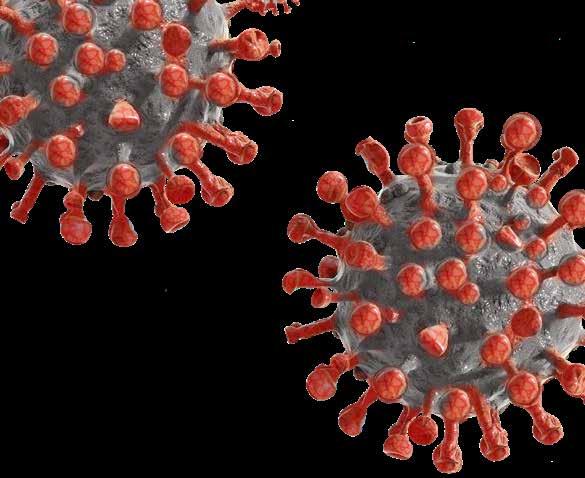
Dr. Nadav Kashtan (Plant Pathology and Microbiology) and Dr. Liraz Chai (Chemistry) are studying how the Coronavirus survives the journeybetweenpeople, increasingtransmission. In an initial study, Kashtan demonstrated that the virus survives better in microdroplets of saliva than other media (e.g. water). Now, the duo is
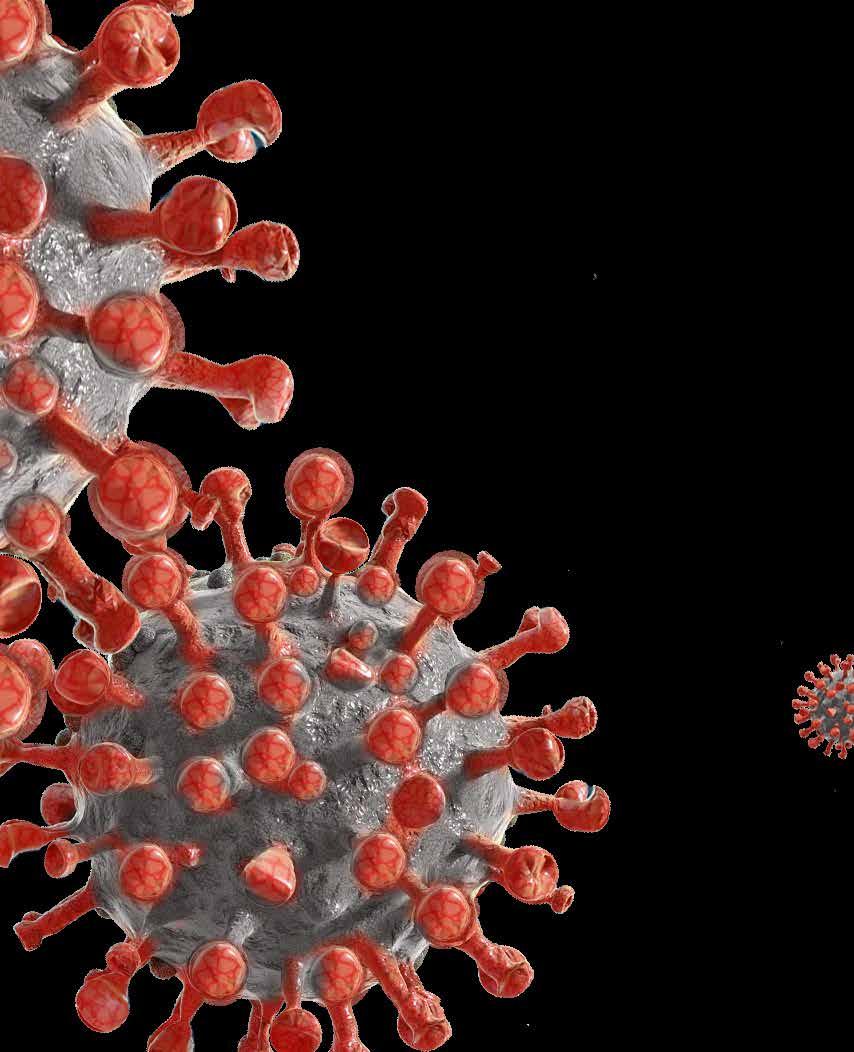
studying the physio-chemical properties of saliva from different people, looking for factors that may influence variances in the survival rate of the virus. They hope that their interdisciplinary research will contribute to a slow in the virus’s spread.
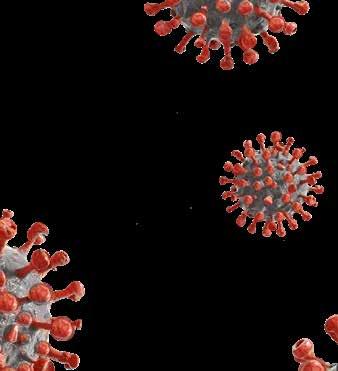
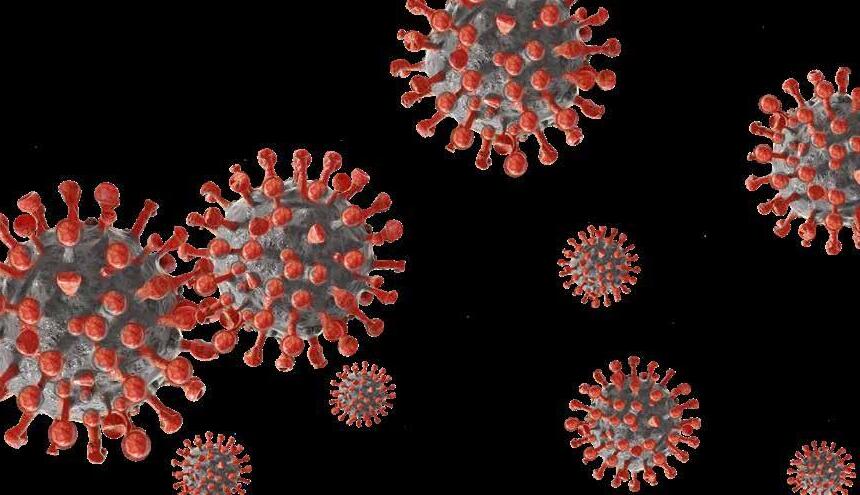
Prof. Asher Ben-Arieh (Social Work), along with research assistants Sagit Bruck and Hamutal Farkash, conducted a survey of Israeli children’s experiences during Israel’s first shutdown. It was based on a questionnaire developed by Children’s World, an international project in which Ben-Arieh is a core member.
The survey revealed that children were curious about the Coronavirus and wanted adults to listen and consider their perspectives. While remote learning, school wasn’t meaningful, and they experienced high levels of boredom. Compared with a study from 2017/18, the children reported feeling less satisfied and enjoying less freedom. At the same time, the majority reported feeling safe
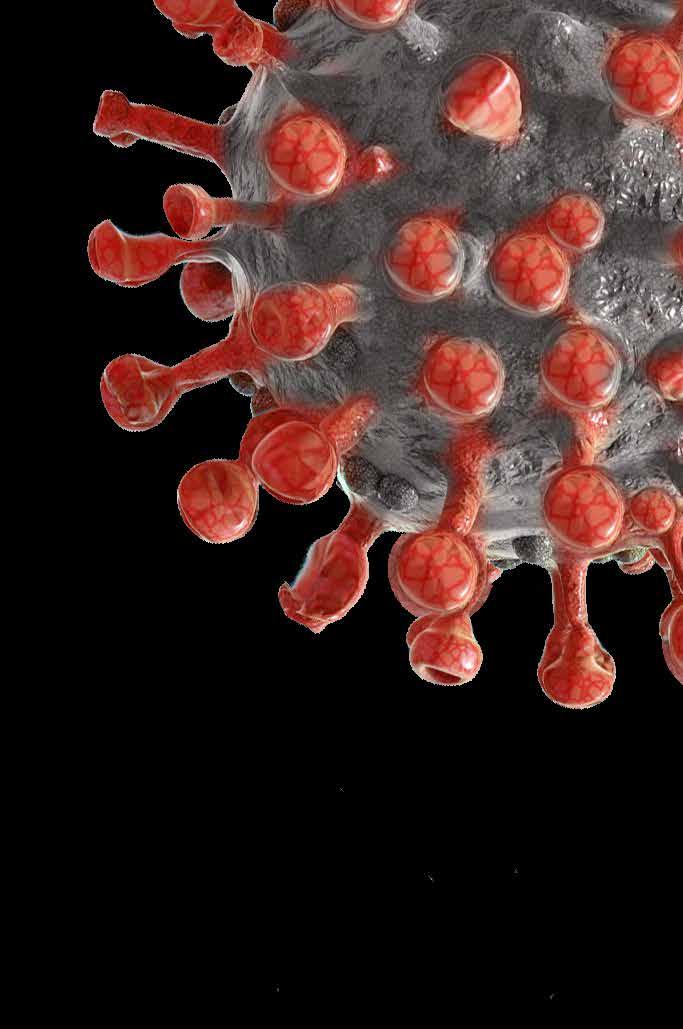
Prof. Gershon Golomb (Institute for Drug Research) is an expert in developing drug delivery systems. Two of his ongoing projects are perfectly poised to help COVID-19 patients.
The first project is an anti-inflammatory drug formulation, which is wrapped in nano- particles that deliver the drug directly to the body’s immune system. The drug has completed two phases of FDA testing.


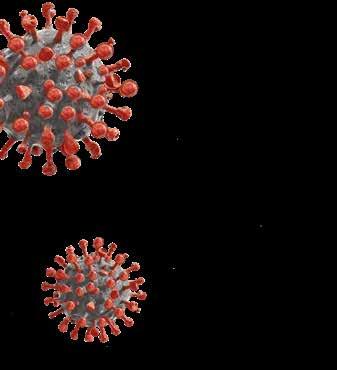
The second project is through the Fraunhofer Project Center for Drug Discovery and Delivery at the Hebrew University. It aims to employ small interfering RNA (siRNA) and drugs to disrupt the replication of the virus within the human body. Golomb is developing a navigator that will target lung cells, resulting in a more effective Coronavirus treatment.
Jordan Hannink Attal recently graduated from the International Master of Public Health, defending her thesis during the shutdown. Having spent two years studying Israel’s population of migrant care workers (MCWs), Hannink Attal immediately began studying MCWs’ well-being during the Coronavirus shut-down.
PhD student Lior Zeevi and Dr. Shir Atzil (Psychology) collected and analyzed video diaries recorded during Israel’s first shutdown. By coding the subjects’ behavior second-by-second, the researchers were able to analyze their well-being and regulatory processes. The researchers divided the subjects into three groups: singles, couples, and couples with children. Their data show that single men and fathers had the worst self-regulation, while women tended to fare better overall. The study also showed that improved self-regulation is associated with better relationships, especially in times of crisis.
Dr. Yehuda Pollak (Education) applied his knowledge of ADHD and risk-taking to identify predictors of non-adherence to the new public health restrictions, with the understanding that non-compliance endangers not only the individual, but their surroundings as well.
Conducted along with PhD student Haym Dayan, Prof. Itai Berger (Social Work) and HU alumna Dr. Rachel Shoham, Pollak’s two studies revealed

Prof. Inbal Arnon (Psychology) studies the acquisition, processing, and representation of language. Prof. Ariel Knafo-Noam (Psychology) studies the development of pro-social behavior and empathy among children.

In 2014 they founded Israel’s first and only Living Lab, located in the Bloomfield Science Museum adjacent to the Edmond J. Safra Campus. The Lab welcomes visiting families, where the children participate in a short, fun activity that teaches them about the science of child development while simultaneously contributing to it. While children participate in studies, parents can discuss current research in the field of child development with the Lab’s staff.
In founding the Lab, Arnon and Knafo-Noam aimed to make developmental findings accessible to parents and the community at large; conduct cutting-edge developmental science; and expose children to scientific research that involves people as a way of increasing children’s interest in science. To date, the Lab has hosted eight researchers from different fields. In 2019/20 alone (when the pandemic forced the museum to close for extensive periods of time), the Lab hosted 15 separate studies. Over the years, findings from the Lab have been the basis for 50 conference presentations and 20 journal publications. The Lab has also trained numerous undergraduate and graduate students how to conduct developmental research.
Over 8,000 children have participated in these activities, sparking conversations about science and strengthening their affinity to the field. In addition, Lab staff have talked with thousands of parents. In terms of findings, Living Lab researchers were the first to demonstrate that motivational principles shape children’s values already at age five and that children’s values at this age predict their generosity. Researchers have added crucial evidence to the nature/nurture debate by showing that children and adults play a different role in the emergence of linguistic structure (using a creative Chinese telephone game), and that children’s statistical learning abilities change with age. ■
The Living Lab is a great example of effective community outreach that also generates cutting-edge science. It is a win-win situation: we get to widen the scope of our developmental research while educating children (and parents) about the beauty and importance of science.Photo by Yael Ilan Research assistant at work in the lab

The Hebrew University-Hadassah Braun School of Public Health and Community Medicine’s International Master of Public Health Program (IMPH) currently has over 900 alumni worldwide. Holding key positions across sectors, IMPH alumni are truly at the front lines of the pandemic: setting national or local policies, coordinating and providing health services, communicating with the public, and more.
The IMPH program maintains an active alumni network over many platforms including WhatsApp. Since the outbreak of the pandemic, alumni have actively reached out to each other and to their alma mater for professional advice and guidance, as well as to share their experiences on the ground. While preventive measures are identical worldwide (e.g. hygiene and masks), IMPH alumni have come up with creative, context-specific solutions to combat the virus in their home countries.
Another way IMPH alumni came together was through the MASHAV-BRAUN School Global COVID-19 Forum, which was co-launched by the Braun School and MASHAV (Israel’s Agency for International Development Cooperation of the Ministry of Foreign Affairs). Eighteen webinars connected IMPH alumni with Israeli and international public health practitioners
“We established a dedicated COVID-19 group in response to an alumnus whohad been tasked with developing his country’s pandemic protocols.”
Dr. Maureen Malowany, IMPH Alumni Academic Coordinatorand researchers and provided an opportunity for participants to share their own experiences, successes, and challenges fighting COVID-19.
The webinars covered a variety of topics: mental health services, food security, personal protection, cyber-surveillance, protecting vulnerable popula -
tions, virus sequencing to understand variations, smoking behavior and tobacco control, aging populations, and more.
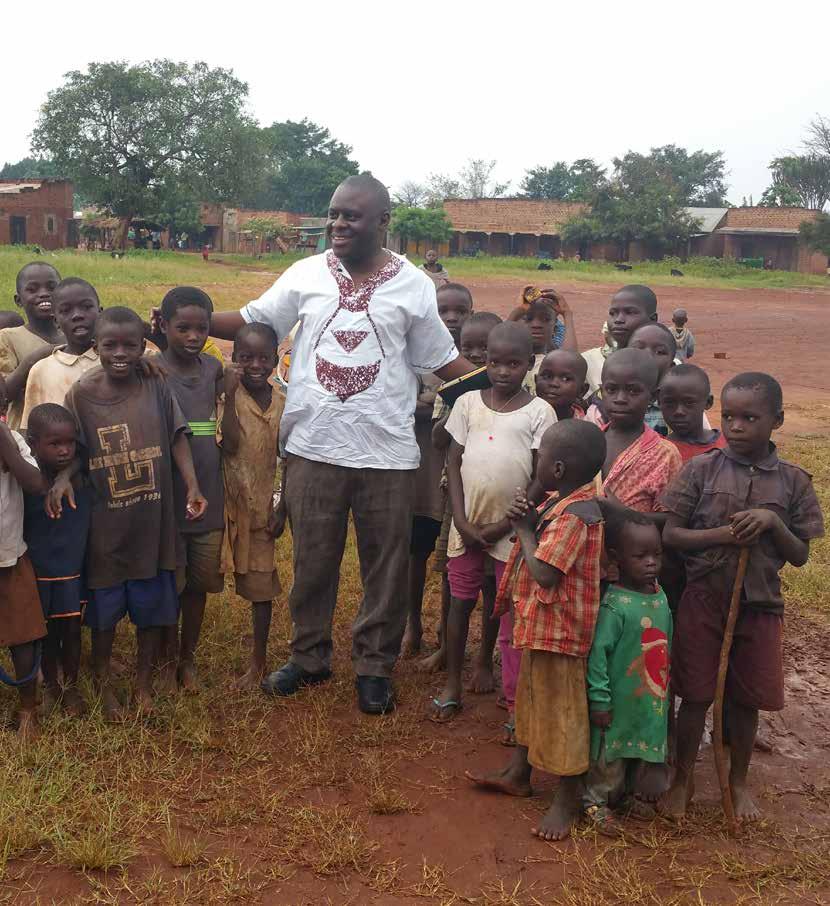
“In April, the Governor of Ondo appointed me to the State’s 7-person COVID-19 Response Fund Committee (RFC), which mobilizes and manages funds to fight the pandemic in Ondo, home to 3.5 million people. In July, he appointed me to head the state’s Inter-Ministerial Committee (IMC), which monitors the rate of contagion, coordinates the different ministries’ responses, formulates strategies and policies, and advises the government. I led the IMC in outlining a strategic roadmap against the pandemic based on scientific and evidence-based approaches, along with community education and engagement, and enforcement of preventive measures. The IMC worked with local and international partners, including the Nigerian Centre for Disease Control, UNICEF, and the private sector. Through the RFC and in partnership with the IMC, the University of Medical Sciences, UNICEF, and the private sector, we established three new isolation wards, expanded the Infectious Diseases Hospital, constructed a molecular biology laboratory, obtained four new ambulances, and purchased equipment, including two ventilators. All this was possible because I am recognized as a public health expert – the foundation for my career was provided by the IMPH program!”
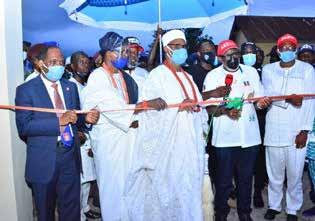


“My specialty is health systems and policy with a focus on reproductive, maternal, newborn, child and adolescent health, and nutrition (RMNCAH/N). I belong to an independent group advising the WHO General Director on continuing these services during the pandemic, with an emphasis on low- and middle- income countries.
I also support the Ministry of Health by drawing upon national data to develop evidence-based responses to the pandemic. These include advocating for services, advising stakeholders on ways to circumvent the virus’ effects, and conducting RMNCAH/H presentations and training
for districts and hospitals. On the clinical side, I belong to an independent advisory committee overseeing a Ugandan trial of convalescent plasma transplants for COVID-19 patients.
All this has been possible by collaborating with the Uganda Ministry of Health, the World Health Organization, UNICEF, academia, other districts, and civil society organizations.
My work has been influenced by two aspects of my studies at the Hebrew University, namely community- oriented primary care and epidemiology training.”

“When the pandemic struck, I was teaching telemedicine to medical students in rural areas. Later, through the Shalom Association, MASHAV in Guatemala, and the Internxational Federation of Medical Students’ Associations (IFMSA), I taught these skills to an additional 300 practitioners.
I co-founded three different pandemic-related organizations. First, the Honduras Research Consortium, an umbrella group of 30 researchers. Second, the UNITEC Observatory of Dengue and COVID-19, which issues a bi-weekly national report. The third is Frena la Curva Honduras (FLCH, Flatten the Curve), a map- based website for posting needs, offers, and learning about nearby
organizations that offer assistance. Along with Foundation Lucas, UNITEC, and Aliv.io, FLCH established a free tele-medicine clinic. Together with Fundación Lucas and IFMSA Honduras, FLCH organized donations of PPE. I conducted trainings on preventive measures, the safe disposal of PPE, developed manuals for safely using public transit –over 2,000 people have accessed this information on Facebook.
Thanks to IMPH, I learned how to work with people from different cultures and how to conduct research. I see myself as part of a large community, where I can ask and give advice. IMPH alumni are my family.”


“The pandemic broke out during my IMPH studies. I was called back to Turkey to work on the front lines and continued my classes online.
I work in the department of public health, which established a contact tracing system for health workers who test positive for the virus. I call to assess these workers’ condition and identify the source of infection. Next, I call their contacts to determine the risk of infection and the best course of action. Our four-person team makes approximately a hundred phone calls a day.
I also work in the COVID-19 Pandemic Clinic for Hospital Workers, where I assess and test workers who suspect they may have been infected, referring them to the contact tracing team when necessary. We handle approximately 80 cases a day.

In addition, all doctors work bi- monthly shifts in the Emergency Pandemic Clinic, assessing and caring for community members who display COVID-19 symptoms.
The knowledge and skills that I gained at the Hebrew University are invaluable to my work preventing the spread of the Coronavirus among the 4,000 health workers at my hospital.”
“I ordinarily detect, report, investigate, and curtail diseases of public health importance in Cross River State, home to over 4 million people. The Coronavirus response now consumes half my time.
Most importantly, I worked to convince the subnational government that hiding suspected cases posed a danger to public health.
I worked with the Nigerian Centre for Disease Control (NCDC) to develop an action plan and trained 2,000+ surveillance personnel in detection, contact tracing, and isolation practices.

Working with the NCDC, the public sector, and the local public health department we upgraded the infectious disease hospital and Calabar Teaching Hospital laboratories, introducing PCR testing.
Access to a local lab has increased testing and made it easier to detect and isolate cases.
Along with a number of local UN agencies, Iparticipate in bi-weekly coordination meetings and have trained nearly 5,000 health care workers. Providing them with knowledge, PPE, and sanitization measures has reduced their infection rates from 30% to 7%.
Working alongside UNICEF colleagues, I have been involved in the development and dissemination of educational materials on hygiene and preventive measures in the community.
My ability to support the Nigerian government in responding to the COVID-19 outbreak was greatly assisted by the classwork and project in CommunityOriented Primary Care at the Braun School.”
“Since the outbreak, I have been serving as Rotary International’s liaison to the Ministry of Health’s national task force. In this position I have been involved with the deployment of sanitation measures, PPE, and other necessary supplies across Kenya –enabling over 5 million handwashes and distributing 46 thousand food packages.
I recently signed a memorandum of understanding between Rotary and UNICEF Kenya to provide the sanitation necessary to re-open 400 schools in January 2021, enabling 160,000 students to safely continue their studies.

I also serve as liaison to the National Business Compact on the Coronavirus (NBCC), which is part
of the Ministry of Health’s national task force. Working with the private sector, NGOs, and academia, I’ve helped fundraise and advise the Ministry of Health on strategic responses and behavior changes, including deploying 7,500 hand-washing stations to hotspots.
I was recently appointed Director of the Peter Ojiambo Foundation, where I undertook a survey of Kenyans living with disabilities under the Coronavirus, in order to inform national- and county-level communications, services, and product design during the pandemic.
The MASHAV-BRAUN webinar series truly expanded my choice of interventions, as I drew upon the wealth of knowledge of IMPH alumni.” ■
A team of researchers from the Hebrew University of Jerusalem has proven the linkages between ultraprocessed foods and reduced bone quality, unveiling the damage of these foods particularly for younger children in their developing years. The study, led by Professor Efrat Monsonego-Ornan and Dr. Janna Zaretsky from the Department of Biochemistry, Food Science and Nutrition at the University’s Faculty of Agriculture, was recently published in the journal Bone Research and serves as the first comprehensive study of the effect of widely-available food products on skeletal development.

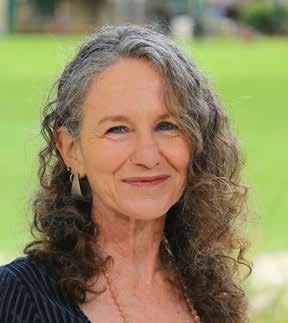
Ultra-processed foods—aka, junk food—are food items products that undergo several stages of processing and contain non-dietary ingredients. They are popular with consumers because they are easily accessible, relatively inexpensive and ready to eat straight out of the package. The increasing prevalence of these products around the world has directly contributed to increased obesity and other mental and metabolic impacts on consumers of all ages.
Children tend to like junk food. As much as 70% percent of their caloric consumption is estimated to come from ultra-processed foods. While numerous studies have reflected on the overall negative
impact of junk food, few have focused on its direct developmental effects on children, particularly young children.
The Hebrew University study provides the first comprehensive analysis of how these foods impact skeletal development. The study surveyed lab rodents whose skeletons were in the post embryonic stages of growth. The rodents that were subjected to ultraprocessed foods suffered from growth retardation and their bone strength was adversely affected. Under histological examination, the researchers detected high levels of cartilage buildup in the rodents’ growth plates - the “engine” of bone growth. When subjected to additional tests of the rodent cells, the researchers found that the RNA genetic profiles of cartilage cells that had been subjected to junk food showed characteristics of impaired bone development. The team then sought to analyze how specific eating habits might impact bone development and replicated this kind of food intake for the rodents. “We divided the rodents’ weekly nutritional intake—30% came from a ‘controlled’ diet, 70% from ultra-processed foods”, said Monsonego-Ornan. They found that the rodents experienced moderate damage to their bone density albeit there were fewer indications of cartilage
buildup in their growth plates. “Our conclusion was that even in reduced amounts, the ultra-processed foods can have a definite negative impact on skeletal growth.”
These findings are critical because children and adolescents consume these foods on a regular basis to the extent that 50 percent of American kids eat junk food each and every day. Monsonego-Ornan added. “when Carlos Monteiro, one of the world’s leading experts on nutrition, said that there is no such thing as healthy ultra-processed food, he was clearly right. Even if we reduce fats, carbs nitrates and other known
harmful substances, these foods still possess their damaging attributes. Every part of the body is prone t o this damage and certainly those systems that remain in the critical stages of development.” ■
Zaretsky, J., Griess-Fishheimer, S., Carmi, A. et al. Ultra-processed food targets bone quality via endochondral ossification. Bone Res 9, 14 (2021). https://doi.org/10.1038/s41413-020-00127-9
Funding: Israel Science Foundation
Link to Study: https://www.nature.com/articles/ s41413-020-00127-9
Jerusalem –
“The crown of wisdom on the head of the Nation” David Ben Gurion
Anacacia Capital is an award winning firms that manages private equity and public equity funds that invest in leading small-medium enterprises Anacacia manages over $600 million.
Please contact jeremysamuel@anacacia.com.au for a confidential discussion.


Researchers at the Hebrew University of Jerusalem have developed an injectable antibiotic with a new mode of action, which could have a significant impact on the morbidity rate for pandemics such as COVID-19, Yissum, the technology transfer company of the Hebrew University announced today.
Mupirocin, a highly effective topical antibiotic was re-formulated by Hebrew University researchers to allow for intravenous delivery, and in doing so they have created new properties to fight drug-resistant bacteria. According to some studies, close to 50% of COVID-19 deaths involved secondary bacterial infections.
According to the European Antibiotic Resistance Organization (AMR), 700,000 people die every year from resistant infections, and if no significant improvement is made in the field, that number will rise to 10 million by 2050. For patients in hospitals with weakened immune systems, such as those with COVID-19, the danger is acute. Moreover, the intensive use in antibiotics during this pandemic is expected to increase this problem even further. Antibiotic resistance is one of the leading threats
to global health, according to the World Health Organization and the US Centers for Disease Control. Prof. Yechezkel Barenholz, the chief researcher behind the study, said, “The ability to take an existing drug and alter the way it works can have a significant impact on the problem of antibiotic resistance and secondary bacterial infections related to COVID-19 and may pave the way for a new treatment regimen. We have had very strong results from relevant animal models, and are looking forward to moving into clinical trials with Nano-mupirocin (the nanoliposomal formulation of mupirocin), as we believe the potential of this discovery is immense.” A toxicity study conducted with Nano-mupirocin demonstrated a very good safety profile enabling human trials.
The innovative treatment, which was advanced through the use of artificial intelligence (AI), was chiefly developed by Prof. Barenholz, who heads the Laboratory of Membrane and Liposome Research at Hadassah Medical School and Dr. Ahuva Cern in collaboration with Prof. Amiram Goldblum, all of whom hail from the Hebrew University Faculty of
Medicine. The research received support from the National Institute of Health (NIH).
The Premier A u ction House for Art and Design 162 QUEEN ST WOOLLAHRA NSW (02) 9326 1588
“Our study demonstrates how nano-liposomes have enabled the creation of a novel injectable antibiotic, and how we have overcome the limitations of existing antibiotics by using nanotechnology approaches,” said Dr. Cern . “This drug, if approved, fundamentally enhances arsenal of antibiotics available to treat resistant infections, including those associated with COVID-19.”
the treatment as part of a groundbreaking study conducted with their German colleagues at the Helmholtz Centre for Infection Research (HZI).
With Compliments of
With Compliments of G.P. ISRAEL DIAMONDS PTY. LTD
The Hebrew University researchers developed
All Correspondence to: PO Box 2117 Rose Bay North NSW 2030
Unit 2/20 William Street, Alexandria NSW 2015
Telephone: +61 2 9318 2680 info@charlestons.com.au
All Correspondence to: PO Box 2117 Rose Bay North NSW 2030
Facsimile: +61 2 9318 2339 www.charlestons.com.au
Telephone: +61 2 9318 2680 info@charlestons.com.au
Prof. Barenholz, a world-renowned expert in liposome based drug development also played a leading role in developing Doxil, a chemotherapy drug based on nano-delivery used to fight cancer through which was commercialized by Yissum, the tech transfer company of the Hebrew University. ■


Facsimile: +61 2 9318 2339 www.charlestons.com.au
Learning has always been the cornerstone of Jewish tradition. There is no more important repository of knowledge than The Hebrew University of Jerusalem.
Learning has always been the cornerstone of Jewish tradition. There is no more important repository of knowledge than The Hebrew University of Jerusalem.
Please remember the Hebrew University when preparing a LAST WILL & TESTAMENT.
Please remember the Hebrew University when preparing a LAST WILL & TESTAMENT.
For further information, please contact the Australian Friends of the Hebrew University of Jerusalem
For further information, please contact the Australian Friends of the Hebrew University of Jerusalem

Tel: (02) 9389 2825
Tel: (02) 9389 2825
In a recent study, titled “Managing the COVID19 Pandemic Without Destroying the Economy”, Hebrew University professors David Gershon (Business School), Alexander Lipton (Business School) and Hagai Levine (Public Health) argue that based on real-life data, Israel and other countries could have controlled COVID-19 without a lockdown.
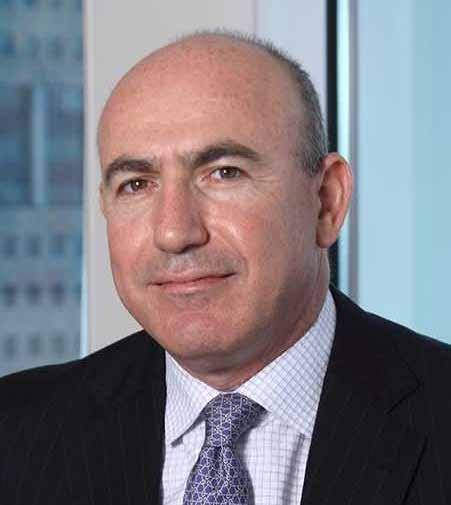
In theory, authorities can stop an epidemic by using the medieval method of quarantining all the population for a prolonged enough period. However, the economic and social toll of a long lockdown these days is catastrophic in any dimension. Expected consequences include enormous unemployment and social aspects of quarantine, such as isolation and loneliness, low access to healthcare, drug abuse and domestic violence, hunger and social unrest and on top of it the destruction of the economy will cause an enormous deficit that will weigh down the economy for years. It is expected to ask if the lockdown is really necessary or is it an act that governments triggered too late when the pandemic has already spread out massively. Often governments state that the purpose of the lockdown is “to flatten the curve”, or in simple words to ensure that the health system does not exceed its full capacity. In the case of COVID-19 the likely measure is if the number of beds in the intensive care unit (ICU) is enough for all the patients that require ICU.
Prof. David Gershon and Prof. Alexander Lipton from the Jerusalem Business School at the Hebrew University, both well-known experts in Finance and Fintech and Prof. Hagai Levine from the School of Public Health of the Hebrew University, a leading infectious diseases epidemiologist and public health physician, developed a very detailed and precise model to calculate the consumption of ICU beds and
hospital beds in general during the spread-out of the pandemic. The model considers each of the stages of the disease and separates between different population groups (for example by their vulnerability to the disease, residential density, behavioral characteristics, etc) and calculates the rate of infection, hospitalization and ICU beds for the different populations.
The model was calibrated with real time data from recent research articles about COVID-19 in different countries with information about infection rates, hospitalization and death cases as well as number of patients in ICU.
According to the model, if a country adopts a policy of social distancing as much as possible, including at work, 14 days self-quarantine of every person with symptoms such as fever or cough, testing all individuals with symptoms and hygiene measures including facemasks in public places, then in most cases there is no need in lockdown. By now, all the high risk population is aware of the danger and the need to over protect itself in general more than the low risk population. Naturally, frequent testing is an advantage that improves the control on the infection but the model assumes that there are limitations with the number of tests that can be provided.
One of the conclusions of the model is that in countries where the number of ICU beds for COVID-19 patients is above 60 ICU beds per million (depending on the ratio between the high and low risk population and the level of compliance of the population to the hygiene measures) then no lockdown is necessary and when the number of ICU beds for COVID-19 per million people is below 60 then a temporary partial quarantine of the high risk population may be required but in any case the economy and society can continue to operate.
When the numbers that correspond to Israel are plugged into the model then under the worst assumptions and without any lockdown the number of ICU beds for COVID-19 patients will not exceed 600. It was published that before the COVID-19 burst there were 2000 beds in Israel and currently
around 3000 beds. This means that the lockdown was unnecessary and could be stopped and replaced with a responsible policy of hygienic behavior in public places mentioned before.
One can explore the results of the model one countries like Sweden, Singapore, Taiwan and South Korea. In all these countries there was never a lockdown and the health system never got close to full capacity, even though the number of ICU beds per population is less than in Israel. Further evidence is provided by the Gertner Institute research of the Israeli Ministry of Health, showing that last March, when the disease just started in Israel, the infection rate was very high (the reproduction number was 3.0) and thanks to awareness of the population to the disease and the caution measures taken by the majority of the population the infection rate decreased significantly (the reproduction number was 1.3 on March 22), before the start of the lockdown period. Since the beginning of the lockdown the further reduction in the infection rate was minor and most likely is a result of the behavior of the population and not the lockdown itself.
With regard to countries like Italy, Spain and the United states where despite the lockdown thousands of people died, the explanation is two-fold. First, in these countries the number of people that die every year from seasonal flu is extremely high, among the reasons is the exceptionally high percentage of high risk population due to aging, and second, most likely when the lockdown was placed the number of infected people was already enormous, and no hygiene measures were adopted before, which could have reduced the infection rate significantly.
Prof. Gershon, Levine and Lipton call for a systematic investigation of the death cases that are caused by the lockdown itself in the short and long term. Such an investigation might show that the growth in the number of death cases related to lockdown is higher than the death cases related to COVID-19. It may have a similar effect to “Iatrogenesis” in medicine, a phenomena where the medicine is more detrimental than the disease itself. ■
Do you remember where you were when you first heard that two planes had crashed into New York’s Twin Towers? Or where you had your first kiss?
Our brains are wired to retain information that relates to the context in which highly significant events occurred. This mechanism also underlies drug addiction and is the reason why hanging out in an environment or with people associated with memories of drug use often leads to relapse.
How our brains create this strong association, however, is less clear. Now, new research by Professor Ami Citri and PhD student Anna Terem
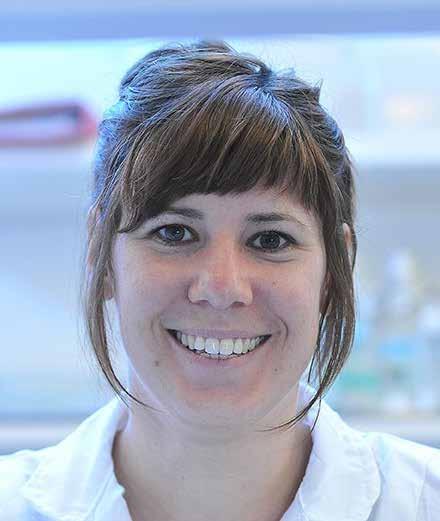
at Hebrew University of Jerusalem (HU)’s Edmond and Lily Safra Center for Brain Sciences and the Alexander Silberman Institute of Life Science, shows that a relatively obscure brain region known as the claustrum plays a significant role in making these connections. Their findings were recently published in Current Biology.
The researchers’ findings fit the idea of “incentive salience”, the process that determines the desirability of an otherwise neutral stimulus. For example, a candy store façade becomes very attractive to kids after repeated associations with the rewarding treats
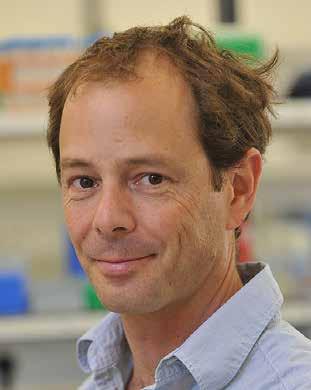
that lie within. In time, children unconsciously learn to “want” to see the store stimulus, which is separate from their “liking” the actual candy reward. Taking a closer look at how context becomes associated with cocaine, the researchers found a group of neurons within the claustrum that lit up during cocaine use. Further, these neurons are pivotal in the formation of an incentive salience that links context with the pleasure of cocaine. To determine when and how the claustrum participates in incentive salience, Citri and his team employed a conditioned-place preference (CPP) test for a group of lab mice. During this test, the mice learned to associate reward with context. The researcher administered cocaine to the mice and placed them in an area with distinctive flooring (rugged) and wall patterns (dots), ones that a mouse would notice, as the drug started to kick in. After a few times of this, when placed in a room where the mice could choose either to hang out in a region similar to the one paired with cocaine (rugged floors and dots wall) or a neutral area (smooth floor and striped walls), the mice would quickly congregate in the area where their drug high had played out.
To test the claustrum’s involvement in how a context becomes associated with a given reward, Citri and his team observed the changes in mice behavior when they inhibited these claustral neurons. They found that the inhibition of these neurons inhibited the mice’s behavioral responses
to cocaine, meaning they no longer preferred hanging out in the cocaine-paired environment. On the other hand, activating these neurons—even in the absence of any cocaine—caused the mice to develop a preference for this context.
Importantly, the team found that the activity of the claustrum was not necessary for retrieval of the cocaine memory. Once the mice had been placed in a cocaine-paired context several times to enjoy their cocaine high, the memory for this context was encoded and inhibition of the claustrum had no effect on their preference for the cocaine-paired context. “These findings boosted our confidence that the claustrum is indeed integral to incentive salience, heightening the awareness of the mouse to the context in which it experienced the drug high” shared Citri.
As the number of deaths caused by drug overdose increases from year to year, this new study has wide-ranging implications towards a better understanding of the nature of addiction and the importance of breaking contextual cues before they develop. “By recognizing that the claustrum plays a pivotal role in creating a context association for reward, it becomes a structure of interest for the field of addiction. We hope this knowledge will lead to the development of new diagnostic tools to identify populations susceptible to addiction, as well as new therapeutic approaches,” concluded Terem. ■

It is a fact that has long baffled doctors: Cancer in the small intestine is quite rare, whereas colorectal cancer, a neighboring though much smaller organ, is one of the leading causes of cancer death for men and women. What is it about the colon that seems to “attract” cancer?
To answer this question, Professor Yinon BenNeriah of Hebrew University of Jerusalem (HU)’s Lautenberg Center for Immunology and Cancer Research and his team led by Dr. Eliran Kadosh, found that cancer mutations are not necessarily bad actors, in and of themselves. In fact, in certain microenvironments like the gut, these mutations can actually help the body to fight cancer, not spread it. However, if the gut microbiome produces high levels of metabolites, like those found in certain bacteria and antioxidant rich foods like black tea and hot cocoa, then it acts as a particularly hospitable environment to mutated genes and will accelerate the growth of bowel cancers. Their breakthrough findings were published recently in Nature magazine.
Ben-Neriah and his team kept gut microbiomes in

mind as they took a closer look at gastrointestinal cancers, and may have found the reason why only 2% of cancers take root in the small intestine, whereas a whopping 98% of cancers take place in the colon. One major difference between these two organs is their levels of gut bacteriasmall intestines contain few, whereas colons contain multitudes. “Scientists are beginning to pay more and more attention to the role gut microbiomes play in our health: both their positive effects and, in this case, their sometimes pernicious role in aiding and abetting disease,” explained Ben-Neriah. A little background. TP53 is a gene found in every cell. It produces a protein called p53 which acts as the cell’s barrier, suppressing genetic mutations in the cell. However, when p53 becomes damaged, it no longer protects the cell. Quite the opposite - it drives the cancer, helping tumours to spread and grow.
To test their theory that gut flora was at play, the researchers introduced mutated p53 (“cancerdriving”) proteins into the gut. Amazingly, the small intestine reacted by converting the mutated
p53 cancer driver back to normal p53, turning into “super-suppressors” that were better at suppressing cancer growth than healthy p53 proteins. However, when mutated p53 was introduced into the colon, they did no switcheroo but stayed true to their driving-cancer nature and promoted the cancerous spread. “We were riveted by what we saw,” recalls Ben-Neriah. “The gut bacteria had a Jekyll and Hyde effect on the mutated p53 proteins. In the small bowel they totally switched course and attacked the cancerous cells, whereas in the colon they promoted the cancerous growth.”
To further test their theory that gut flora was a major factor as to why mutated p53 were acting as tumour blockers in the small bowel but tumour accelerants in the colon, the scientists administered antibiotics to kill off the colon’s gut flora. Once they did, the mutated p53 was not able to go on its cancer spree. What is in this flora that makes colon cancer spread so quickly? A close analysis identified the culprit: gut flora that produces metabolites, aka “antioxidants”, which are found in high concentrations in foods such

as black tea, hot chocolate, nuts and berries. Tellingly, when the scientists fed mice an antioxidant-rich diet, their gut flora accelerated p53’s cancer-driver mode. This finding is of particular concern to those patients with a family history of colorectal cancer. “Scientifically speak ing, this is new territo ry. We were astonished to see the extent to which microbiomes affect cancer mutations—in some cases, entirely changing their nature,” shared Ben-Neriah. Looking towards the future, those at high-risk of colorectal cancer may want to screen their gut-flora more frequently and think twice about the foods they digest, antioxidant and otherwise. ■

Education is always a great investment.

Recent years have provided substantial research displaying the effect of genetic mutations on the development of autism and other neurodevelopmental disorders. Based on those studies, researchers have focused attention on the commonalities behind those mutations and how they impact on the functioning of the brain. A study conducted by Professor Sagiv Shifman from the Life Sciences Institute at the Hebrew University of Jerusalem and the Center for Autism Research has found that genes associated with autism
tend to be involved in the regulation of other genes and to operate preferentially in three areas of the brain - the cortex, the striatum, and the cerebellum. The cerebellum is responsible for motor function and recent findings have indicated that it also contributes to the development of many social and cognitive functions. Based on these findings, the research team is hopeful this can lead to a better understanding of the relation between the cerebellum and autism and even lead to new therapies in the future.
The research study published in Nature Communications tested one of the most prominent genes associated with autism, Pogz. Professor Shifman chose this specific gene based on prior findings that links it to developmental disorders and overly friendly behavior in some patients on the autism spectrum. In partnership with Professor Yosef Yarom from the Edmond & Lily Safra Center for Brain Sciences at the Hebrew University and other laboratories around the world, the research team investigated how a mutation in the Pogz gene impacted on brain development in mice and specifically on the functioning of the cerebellum. The findings concluded that the mutation led to hyper-social behavior and learning disabilities while also impacting on the physical development of the mice. Upon further investigation, the research team also observed that the genetic mutation affected the proliferation of cells in the brain and inhibited the production of new neurons. The researchers believe that this may be a reason why some children with the
mutation exhibit smaller than average head sizes. While there are presently no effective medicines for the main symptoms of autism, Professor Yarom believes that this research could be instrumental in developing drugs for directly changing the neural processes in the cerebellum. Previous research conducted by Professor Yarom showed that specific chemical agents could change the active functioning of the cerebellum. Ongoing research will therefore be focused on whether similar approaches could lead the lab mice to change their behavior and reverse the effects connected with the mutation.
“Our work with this specific gene that we know is connected to autism and significantly impacts on the functioning of the brain provide us with considerable hope that we will be able to develop medicines to assist children with autism,” Professor Shifman said. Professor Yarom added, “Enhanced understanding of the neurological processes behind autism opens up hope-filled possibilities for new treatments.” ■
The Erdigroup collection currently consists of five hotels across two states of eastern Australia. Our diversification allows Erdigroup to provide every guest, of every taste and need, a memorable experience - the Erdi experience www.erdigroup.com.au

congratulates the Hebrew University on its continuing excellence as Israel’s preeminent university and one of the world’s top ranked universities.


Founded in 1964, Yissum serves as a bridge between cutting-edge academic research and a global community of entrepreneurs, investors, and industry. Yissum has registered over 10,000 patents covering 2,800 inventions; licensed over 900 technologies and has spun out over 170 companies. Yissum’s business partners span the globe and include companies such as Boston Scientific, Google, ICL, Intel, Johnson & Johnson, Merck, Microsoft and Novartis.

Yissum, the Technology Transfer Company of the Hebrew University, announced that Dr. Itzik Goldwaser will succeed Dr. Yaron Daniely as CEO of Yissum.“ I feel privileged to become Yissum’s CEO and am looking forward to deepening the relationships between industry and academia, maximising the huge potential of the Hebrew University's know-how, and adding value, together with Yissum's outstanding team,” said Dr. Goldwaser. “I’ve been with Yissum for almost ten years and have a keen appreciation for the vital role technology transfer plays in bringing innovation to the marketplace and to where it will have the greatest impact.”

Yissum announced a strategic partnership with Universal Materials Incubator Ltd. (UMI), a 16.5 billion yen ($152 million) venture capital investment fund from Japan. The strategic partnership will focus on adapting Hebrew University technologies to the Japanese market allowing Yissum and UMI to grow their international presence and create joint investment opportunities.
UMI is investing in Yissum’s Racah Nano Venture Fund, an investment vehicle focussing on Hebrew University innovations in advanced materials and nanotechnology. The Racah Nano Venture Fund has now raised over $7 million from international
and strategic investors.
“Israel is a global leader in the startup ecosystem and one of our top international targets for finding investment projects that contribute to the development of the Japanese materials and chemical industries.” said UMI chief information officer Dr. Shosuke Kiba.

Startups from Yissum raised $79 million in the first half of 2020. Despite the continuing global uncertainty caused by the coronavirus and ongoing lockdowns around the world, 14 Yissum spinouts raised tens of millions of dollars in early stage funding rounds. Investments were made in companies in the cleantech, agriculture and foodtech sectors as well as in life science, AI and education. Despite the fact that VC investments in the US and Europe were down, the number of VC deals in Israel reached an all-time record in the second quarter of 2020.
The record amount of money raised in Israel was done so by just 174 companies. “We’re proud that the innovative companies emerging from research at the Hebrew University are continuing to grow even during these challenging times,” said Dr. Itzik Goldwaser, CEO of Yissum. “The fact that $79 million was raised by these early stage companies across a number of different sectors illustrates that the technology developed and cultivated at the Hebrew University is having a global impact.” Yissum spinouts that raised funds during in the first half of 2020 include Tissue Dynamics, an AI organ-on-chip drug development company, and an immune-oncology biotech focused on cancer therapies.
Yissum serves as a bridge between cutting-edge academic research and a global community of entrepreneurs, investors and industry. Yissum’s mission is to benefit society by converting extraordinary innovations and transformational technologies into commercial solutions that address our most urgent global challenges. ■
OVER 50 YEARS IN THE PROPERTY INDUSTRY
$24.3 Billion in property & construction transaction delivery
To discuss how Pomeroy Pacific can assist you with adding value to your current or future projects, contact us today on 03 8825 6777 or visit www.pomeroypacific.com.au




A team of Hebrew University researchers has successfully used genetic engineering as a first step to what one day may allow scientists to genetically repair damaged brain circuits. The process, which was performed in tiny translucent C. elegans worms, saw the introduction of synthetically engineered connections (or synapses), as a means for bypassing missing connections between neurons in an impaired brain.
The team, led by Dr. Ithai Rabinowitch, a Neurobiologist in the Faculty of Medicine at Hebrew University, applied the genetically engineered bypass to repair a failed odour response in the worms due to neuronal loss. With the synthetic bypass network in place, the worms successfully responded to the odour stimuli, a behavior that was diminished in the absence of the genetically engineered “fix.” The study, published in Cell Systems, was jointly led by Dr. Jihong Bai of the Fred Hutchinson Cancer Research Center in Seattle, Washington.
“While this is a discovery that has so far been limited to a tiny worm, it opens the door for potential applications that may be relevant down the road to humans,” Dr. Rabinowitch said. “At present, various approaches are used for addressing human brain damage, including brain-computer interfaces that are
based on external electronics rerouting information flow between intact brain regions. This research indicates a new potential route for addressing brain damage, whether caused by direct physical trauma or stroke or other neurological disease, through genetically engineered changes in brain connectivity that can serve as biological neural bypasses.”
The researchers say that the species chosen, C. elegans, measuring about a millimeter long, is very beneficial for biological research. Compared to us, the worm has a very simple nervous system, and yet it is a multi-cellular animal sharing many similarities with us. According to Dr. Rabinowitch the next steps will involve deeper testing of the broader biological impact of genetically inserted neuronal connections and also applying the approach to other neural circuits and other organisms. “In studying this tiny worm, we were able to advance our theory in an organism that has only several hundred neurons as opposed to the tens of billions neurons in the human brain,” he says. “Our great hope is that as this study advances and is applied more broadly in the worm’s nervous system and in other organisms, we will one day be looking at genetic therapies based on synthetic brain rewiring as possible treatments for devastating brain disease and damage.”

ABN: 53 098 642 641
Suppliers of Industrial Hardware to metal fabricators in electronic, automotive, caravan, food processing & defence industries.


353 Victoria Street, Brunswick. 3056. Phone: 03-9388 2551. Fax: 03-9387 5758 sales@conceptlatch.com.au www.conceptlatch.com.au


According to the World Health Organization, some three-quarters of the world's population has no access to ultrasounds, X-rays, magnetic resonance images and other crucial medical imaging technology. Responding to human need, scientists at the Hebrew University have made it possible to transmit medical images via the humble mobile phone, bringing expert diagnoses to even the most remote corners of the world.
Also at the Hebrew University, many of the world's greatest scientific minds are working together across disciplines and uniting their areas of expertise to achieve a deeper understanding of the human body – their insights are leading to lifesaving discoveries. Interaction between basic scientific research and its clinical applications is a University hallmark, with such collaborations leading to the development of a treatment proven to ameliorate the symptoms of Parkinson's disease as well as approved drugs to treat Alzheimer's disease (Exelon) and cancer (Doxil). Other initiatives, such as inhibitors of head trauma, epilepsy and cancer plus advances in artificial limb control are in advanced stages of development. Imagine what is next.
Support the University – Benefit the World
austfhu.org.au
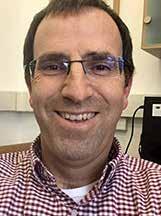
While Parkinson’s Disease is one of the most common neurological disorders, physicians still lack a validated lab-based methodology, or biomarker, for diagnosing it definitively. Rather, neurologists primarily rely on a clinical diagnosis that is based on the appearance of specific motor symptoms that indicate a patient is suffering from the disease. What gives rise to the motor symptoms is a loss of dopamine cells in the brain. Unfortunately, by the time the disease is diagnosed, too many dopamine cells are lost, limiting the prospects for recovery. Instead, the available treatments target the symptoms of Parkinson’s but cannot reverse the progression of the disease.
Prof. Joshua Goldbergence Advances, hypothesizes that one possible key for diagnosing Parkinson’s disease earlier is to better understand the physiological process underlying constipation, which is a common – while not usually discussed – non-motor symptom of Parkinson’s. Importantly, constipation can predate diagnosis by up to 20 years.
But a recent discovery by a team from the Hebrew University of Jerusalem led by Professor Joshua Goldberg of the Department of Medical Neurobiology has successfully identified a chain of cellular and physiological events that have the potential to provide some help in diagnosing the disease years earlier. Specifically, the research conducted in collaboration with Professor Jochen Roeper of the Goethe University in Frankfurt, Germany and published in the journal Sci-
The path to this latest discovery goes all the way back to 1912 when Dr. Friedrich Lewy first published the existence of a buildup of tiny deposits of protein waste within brain cells called Lewy bodies. Twenty years ago researchers elaborated on this finding and described how these Lewy bodies spread throughout the brain of Parkinson’s patients. But while this finding was viewed as a potentially groundbreaking, the Lewy bodies remain clinically inaccessible preventing the ability to determine whether a person has them, even though they may be lurking in the brain for many years before diagnosis.
The science thus focused on trying to link the Lewy body buildup with specific known non-motor symptoms of Parkinson’s. These included anxiety, sleep disorder, loss of the sense of smell and notably
constipation. Scientists proposed that the Lewy bodies were building up in specific areas of the brain and killing the brain cells that control the healthy functioning of relevant parts of the body. Interestingly, one of the first locations where Lewy bodies are found in the brain is an area that affects gastrointestinal motility, providing a potential explanation for constipation in Parkinson’s patients. The problem with this proposition is that Lewy bodies do not necessarily kill brain cells, and may instead represent the cells’ coping mechanism. Therefore, Professor Goldberg’s team, searched for a mechanistic explanation tying Lewy bodies to constipation that does not depend on them killing brain cells.
To this end, Professor Goldberg’s team over-expressed a specific protein, alphasynuclein – that was already known to aggregate as the main constituent of Lewy bodies – in mouse brain cells that control gastrointestinal motility. The result was that the over-expression of the protein caused these brain cells to shrink and their electrical activity to slow down- directly affecting the physiological properties that led to the constipation. It is thus likely that this is the process that also occurs in humans in the early stages of Parkinson’s Disease.
According to Professor Goldberg, “As far as we know, this is the first time that anyone has described a causal chain of events connecting between how alpha-synuclein protein impacts brain cells and the early symptoms that we have long known predate this disease.”
On a diagnostic level he says that this finding may help physicians detect the disease earlier in the future. “Consider a 55 to 60-year-old patient suffering from constipation. We may someday design a test based on the neural changes we discovered to determine whether there is a neural factor at play which could hint to Parkinson’s.” While he admits that this is still hypothetical, “one day in the future we are confident that we will be able to identify a variety of biomarkers
– including physiological ones, like the one we propose – that will allow us to definitively diagnose the disease far earlier than we are currently able.”

The potential behind such an early diagnosis is enormous because at present there are no therapies capable of stopping the progression of the disease. The hope is that with early intervention certain therapies that are unsuccessful at a later stage may actually be able to halt the progression of Parkinson’s disease.
Professor Goldberg states that the research would not have been possible without the dedication of Dr. WeiHua Chiu and the help of fellow Hebrew University researchers including Professor Menachem Hanani, Professor Rami Yaka, Dr. Danny Ben Zvi and Dr. Hadar Arien-Zakay. ■

The Hebrew University of Jerusalem

Original thinking. Innovative ideas. In a country renowned for the intellectual strength of its people, one name shines out. The Hebrew University of Jerusalem is a beacon of light, showing the way to a better future.You can help ensure that Israel continues to produce some of the world’s finest minds by supporting the Australian Friends of the Hebrew University.
ARNOLD VAN ROOIJEN & CO PTY LTD


Original thinking. Innovative ideas. In a country renowned for the intellectual strength of its people, one name shines out. The Hebrew University of Jerusalem is a beacon of light, showing the way to a better future.You can help ensure that Israel continues to produce some of the world’s finest minds by supporting the Australian Friends of the Hebrew University. Call
Call us on 02 9389 2825 or email austfhu@austfhu.org.au
Support the University Benefit the World
Architects, Suite 2, 2B Norwich Road, Rose Bay NSW Tel: 9371 9677

GREENCORP PTY LTD
80 Perry Street, Matraville NSW 2036 Tel: 9661 6511 WISHING
FLORE & EDDIE JAKU
NAOMI & JESSE TRACTON & FAMILY
W i t h C o m p l i m e n t s
287 Clarence Street, Sydney N.S.W. 2000

Tel: (02) 9261 1900


Fax: (02) 9264 1466
Email: leather@aitopper.com.au Website: www.aitopper.com.au



There is no overestimating the importance of pollinators in our world today. While crop pollination relies mainly on managed colonies of the domesticated honey bee (Apis mellifera), wild, unmanaged pollinators were found to be highly effective, often critical contributors to pollination services in natural and agricultural systems. Among these wild pollinators, native bees are the most important pollinator group Recognizing their importance, Israeli researchers were excited upon the discovery of a new bee species in the Coastal Plain region, particularly in light of decreases in pollinator populations, most notably bees, in many parts of the world. In response to the decrease, biologists have placed habitat preservation and restoration as one of the key tools in protecting pollinators, and biodiversity as a whole. In the process of ongoing studies on how to conserve such habitats currently ongoing in Israel’s Sharon (coastal) region, researchers were surprised to discover a previously unknown wild bee species. The discovery was recently published in the Belgian Journal of Entomology.
The Israeli study focused on the impact of restoration activities of a threatened sand ecosystem along Israel’s coastal plains. Large-scale Eucalyptus plantings that took place in this region in the last decade, caused dramatic changes in habitat characteristics and decreased local biodiversity. Researchers led by Professor Yael Mandelik and PhD candidate Karmit Levy from the Department of Entomology in the Faculty of

Agriculture, Food and Environment at the Hebrew University of Jerusalem have spent the past five years studying the effect of these restoration activities and specifically how they affect the local bee population.
Using a variety of classical methods for surveying insects and plants, the team found reasons for optimism in the gradual change following restoration actions.
“We observed changes in bee communities and in the availability of their food and nesting resources in the restored habitats. In general, we can see that restoration efforts have positive effects on bee communities” explained Ms. Levy.
Alongside these optimistic findings, the researchers recorded another exciting discovery; a new species of bee that had never before been recorded and that is believed to be unique to sand dunes found on Israel’s coastal plains. The species identified and described by Dr. Alain Pauly, a taxonomist (classifier of species) from the Royal Belgian Institute of Natural Sciences in Brussels. The name chosen for the species was Lasioglossum dorchini in tribute to the Israeli bee researcher Dr. Achik Dorchin, The Steinhardt Museum of Natural History, Tel Aviv University.
“Beyond just the professional excitement of discovering a new species that was previously unknown to science, this finding has broader applicative value in helping us better understand bee communities, their habitat requirements and the pollination services they may provide,” Professor Mandelik said. ■

Long before anyone considered the possibilities of instantaneous communication, postcards served as the primary way to keep in touch, send pictures, collect souvenirs, and to share experiences with family and friends in far-away places. However, for London based-accountant and renowned postcard enthusiast, David Pearlman, 19th and 20th-century postcards from the Holy Land also serve as an invaluable window into the modern history of the Land of Israel.



For over fifty years, Pearlman actively worked to amass a collection of over 140,000 postcards that depicted many aspects of life and scenery in Palestine dating back from the time of the Ottoman Empire through the British Mandate and modern Israel. These postcards, the oldest one sold in Palestine in 1883, document an array of historical events that provide us with a window into the past.





For years, Pearlman stored the postcards in his garage, and when the collection grew too large, he moved his car to the street to make more room for his postcards. He reached out to Dr. Dani Schrire, director of the Hebrew University’s Folklore Research Center to offer him a viewing of his collection for academic purposes.

After Schrire’s visit to Pearlman’s overflowing London- based garage, Pearlman truly realized the impact that his collection would have on
This collection has amazing research potential. The postcards are relevant to researchers studying art history, folklore, cultural studies, anthropology, communications, geography and more. It’s hard to fathom how many disciplines can benefit from this collection.
Dr. Dani Schrire, Director, Hebrew University’s Folklore Research Centerfuture research and decided that the Hebrew University should be its new home.
In addition to collecting the postcards themselves, Pearlman has also researched their background, providing the University with valuable documentation of the history of over 1,500 different postcard publishers.





Each postcard is unique, and many contain messages to friends and family members who had also spent time in Palestine. Pearlman’s affection towards his collection is evident in his response to the question which postcard he loved the most. “They’re all my favorites. It’s like touching a piece of history.”

Schrire and his colleague in the graduate Program for Folklore and Folk-Culture Studies, Prof. Hagar Salamon, were overjoyed upon receiving the collection and reflected upon the impact it would have in the future. ■

 David Pearlman
David Pearlman
Grab your hard hat and check out the impact of new donations on campus. See how they are laying the groundwork for new and cutting- edge research and innovation.

With three buildings spanning a total area of 127,000 sq.m., an additional tower with a total area of 140,000 sq.m., and the expectation to create approximately 5,000 new jobs - High Tech HUJI Park will bridge academia and industry, providing a home for start-ups while fostering innovation across the University community.
This new exciting venture, the first hightech park in Israel on a university campus, will solidify Hebrew University as a leader in technology and innovation.
A main advantage of the high tech park is the Edmond J. Safra Campus location. Already home to 50 companies - including international companies in high tech, cyber, biotechnology, nanotechnology, medicine, and pharma - the expanse of the park and its facilities will allow for even more rental space, business opportunities, collaboration, and expansion.
The architectural plans seek to merge traditional Jerusalem design with modern aesthetic - incor-


porating arched alleyways, courtyards built with wells of light, a main thoroughfare and a rooftop balcony with views of the Old City. The park will have development centers, offices, and laboratories on campus, and bright, open and versatile spaces that will be conducive to study, research, leisure sports, and work.

Housed on the third and fourth floor of the Baron de Hirsch Meyer Building, The Justice Mishael Cheshin Center for Advanced Legal Studies, unites all advanced academic learning in law by graduate students and junior researchers in a spacious, open and light filled facility.
Established by the Faculty of Law in partnership with the Cheshin Family in 2016, the building is a testament to the work of former deputy Supreme Court president and Hebrew University graduate Mishael Cheshin, and his lifelong dedication to judicial activism. His widow, Ruth Cheshin, has been involved in the project since its inception, and seeks to make the Center a physical and intellectual hub of all graduate-level research and teaching in the field of law.

The Center’s main space is an extensive area whose large glass walls and adjacent wraparound terrace offer views of the Mount Scopus Campus’ main pedestrian thoroughfare and of the historic David Wolffsohn Building. The space will be used for large events and gatherings.

The Cheshin Center is part of a University-wide endeavor to create innovative graduate school-style centers that cater to different types of study. The third and fourth floor include a multitude of rooms, offices, and workspaces that allow for lone study, havruta-style pairs, small seminars, workshops, and formal lectures.

Hebrew University is a known leader in the fields of Nano and Quantum science. To leverage the potential synergy and provide cutting-edge infrastructure to each, the University has embarked on a bold initiative to create a new home for the Quantum Information Science Center together with the Harvey M. Krueger Family Center for Nanoscience and Nanotechnology. The NEQST (NanoscalE Quantum Science & Technology) Innovation Building will co- locate those two disciplines and combine their expertise and resources – making the building a hub for groundbreaking and life changing solutions. This project is made possible in part by support from Patrick Drahi.

The state-of-the-art building includes a glass exterior, enabling the use of natural light to brighten the interior and provide a bold and dynamic outer appearance. The building will have green building standards, ensuring energy efficiency and sustainable development.
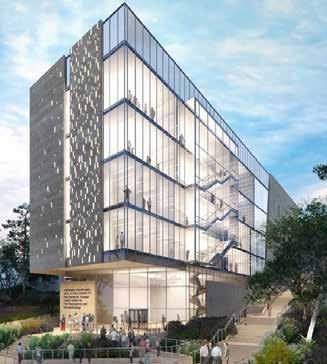
NEQST will house 15 labs that will offer access
to state-of-the-art technologies and technological expertise - enabling pioneering research in nanoelectronics, nanophotonics and 3D printing. The workspace will be constructed as a flexible lab – sharing equipment to leverage resources, thereby supporting more en- gagement and collaboration between researchers and ensuring faster results.

Since the onset of the Coronavirus, Hebrew University scientists and students have been hard at work developing diagnostic screenings, therapeutic treatments, and vaccines to prevent and minimize the disease. But essential to battling the Coronavirus is the ability to conduct research that involves direct contact with the live virus without infecting those engaged in the research or the surrounding environment.
Hebrew University’s Barry Skolnick Biosafety Level 3 (BSL3) National Laboratory will provide a facility fully equipped to provide necessary protection to its researchers. No other civilian or academic biosafety level 3 exists in Israel - putting Hebrew University at the forefront of the fight against COVID-19 and future pandemics.
The BSL3 is located at Hebrew University’s medical campus adjacent to Hadassah Medical Center. This will allow researchers to have direct

access to patients and patient samples and be open to civilians, academics, and clinical researchers across Israel.
The lab will have two wings: a virus isolation and tissue study wing as well as an animal research wing which would house biological (mouse) models infected with the virus.
The facility will be built according to the strict BSL3 standard, equipped with a special air conditioning system that operates at lower air pressure to prevent virus leakage and a full array of advanced testing and experimentation tools and high-level protective gear.


The James J. Shasha Complex for Psychological Sciences at Hebrew University is making great strides in the study of psychology - housing programs, faculty, and students in a spacious and inclusive environment, and conducting cuttingedge research to train the next generation of psychologists, as well as the greater public, about the science of psychology. Made possible by a generous gift from the late Argentinian businessman and benefactor, James J. Shasha, the 2,016 square meter complex was constructed atop three of the Faculty of Social Sciences’ seven departmental-disciplinary blocks, constituting the fifth floor of these three blocks.
The complex, located on Hebrew University’s Mount Scopus Campus, was designed by the internationally acclaimed town planner and architect, Dan Eytan, whose portfolio in Israel includes design of the Tel Aviv Museum of Arts, town plans for South East and Central Jerusalem, Tiberius and Tel Aviv, and a range of high-rise business and residential structures around the country. Like his other designs and city plans that mindfully integrate modern structures within historical cities, Eytan’s design for the Shasha Complex for Psychological Sciences has both an open vista to the historical Old City of Jerusalem and enhances the landscape and skyline of modern Jerusalem. Programs housed in the complex include the award- winning Hebrew University Psychology Department and Glocal, an innovative 18-month graduate program, teaching MA students international development to empower communities in need across the globe. ■

Partners
Joseph Franck
Mark Saltzman
Danny Lustig
Gideon Rathner
Joseph Kalb
Daniel Franck
Loren Datt
Level 7 616 St Kilda Road Melbourne Vic 3004 Australia
T: 3 9525 3777
F: 3 9537 1104
www.lowelippmann.com.au



The Hebrew University’s Faculty of Medicine is at the forefront of developing preventative treatments and cures for cancer tumours by identifying their individual idiosyncrasies and using that information to destroy them.

Help The Hebrew University continue its ground breaking work.
Strand Arcade, Sydney 9231.3038 Factory/Shop/Office
20-26 Allen St Waterloo 9319.6574 nutshop.com.au








Royal Crown Group
Design and construct sites available in Sydney for commercial and industrial use
Call 9267 0200


Bayswater Gardens overlooking Hen and Chicken Bay at Abbotsford redefines aged care in Australia.

• 24 hour registered nursing care with highly experienced and caring staff
• Extra services, dementia care, palliative care and respite care
• Luxurious private suites with ensuites

• Fresh à la carte meals prepared by our Executive Chef
• Life enriching activities and active community involvement
• Hair and beauty salon, hydrotherapy pool and gym on site
• Multi-award winning aged care provider since 2000
We invite you and your family to call us on 02 9712 0100 to obtain further information on how we can provide wellbeing, security and excellence.
bayswatergardens.com.au







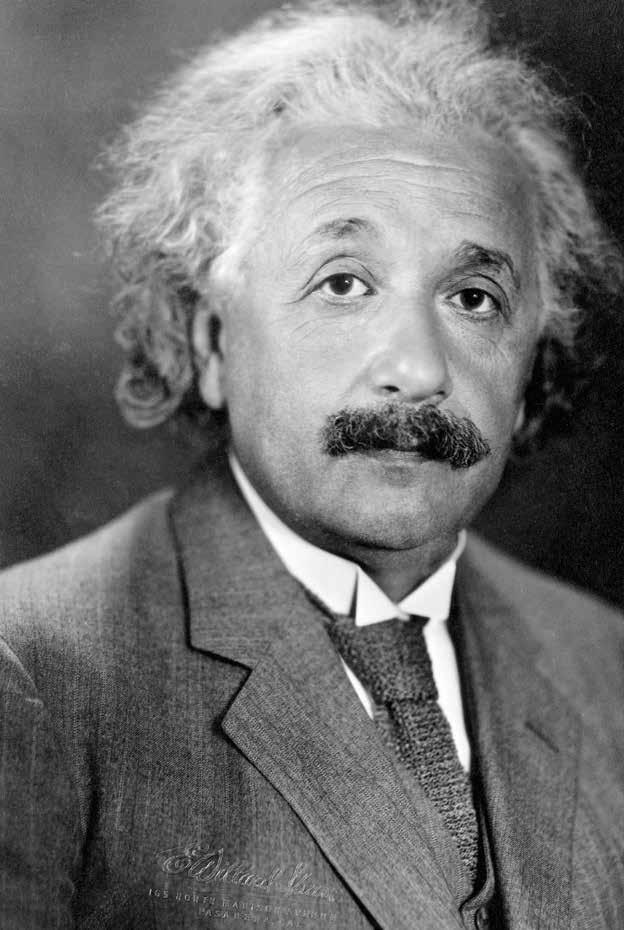
ARGENTINA
T +54 11 4374 7045 info@huji.org.ar www.huji.org.ar
AUSTRALIA
T +61 2 9389 2825 austfhu@austfhu.org.au www.austfhu.org.au
AUSTRIA
T +43 1 795 3031 Marcel.landesmann@gutmann.at
BELGIUM
Brussels T +32 2 343 5546 contact@uhjerusalem.be www.befhu.org
BRAZIL
T +55 11 972 426 695 amigosbrasiluhj@gmail.com
CANADA
T +1 416 485 8000 Toll Free 1-888-HEBREWU info@cfhu.org www.cfhu.org
CHILE
T +56 2 955 5067 simar.univhebrea.chile@gmail. com
DENMARK
T +45 4583 8407 solovej@math.ku.dk
EUROPE
T +972 2 588 0455 europeanoffice@uhjerusalem.org www.efhu.org
FRANCE
T +33 1 4250 4323 cbelais@uhjerusalem.org www.ffhu.org
GERMANY
T +49 30 30 839 122 info@fhuj.org www.gfhu.org
ISRAEL
T +972 2 588 2840
F +972 2 588 2829 diklaa@savion.huji.ac.il http://alumni.huji.ac.il/ http://shocharim.huji.ac.il/
ITALY
Milan Office
T +39 02 7602 3369 aug.it@tiscalinet.it Rome Office/ BrainForum Italia
T + 39 339 886 6133 info@brainforum.it www.brainforum.it
JAPAN
T +81 75 461 4603 tsujita@h2.hum.huji.ac.il
LUXEMBOURG
T +352 2 402 545 alainm@pt.lu
MEXICO
T +52 55 9150 2995/6 info@amauhj.org.mx www.amauhj.org.mx
THE NETHERLANDS
T +31 6 5434 6641 info@nvhu.nl www.nvhu.nl
NORWAY
T +47 7 394 1270 amycons@online.no
PANAMA ibtesh@rejovot.com
PERU
amigos.uhj.pe@gmail.com
PORTUGAL
T +351 937 589 095 carp.jose@gmail.com europeanoffice@uhjerusalem.org
SOUTH AFRICA
T +27 82 551 2126 safhu@beyachad.co.za www.safhu.co.za
SWEDEN
Stockholm T +46 70 89 49 481 petergoldmanoffice@gmail.com
SWITZERLAND
Zurich T +41 79 623 10 48 info@huj-friends.ch www.chdfhu.org
Geneva T +41 22 732 25 67 geneva@uhjerusalem.org www.chfhu.org/
UNITED KINGDOM & IRELAND
T +44 20 8349 5757 friends@bfhu.org www.bfhu.org
UNITED STATES
T +1 212 607 8500
Toll Free 1 800 567 AFHU info@afhu.org
www.afhu.org
URUGUAY
T + 598 2 712 3523 amigos.huji.uy@gmail.com